#thermidor did nothing wrong
Note
Yes, I mean how do we "know" he was a virgin, it seems like an assumption historians take for granted and I'm curious if there's a basis for it
We don't know if he was a virgin or not. The fact there are no indisputably confirmed lovers doesn't mean that he never had sex in his life. It is also not about stuff that he wrote or said. But I am not sure that historians take this for granted - what are your sources for it? I did hear speculations about it and, particularly lately, that he might have been asexual (not that asexual necessarily means no sex ever) but not a consensus among historians that he never had any sexual experience.
Rather, "Robespierre a virgin" narrative is formed as part of a propaganda against him. Because to be a virgin is not to be a "real man" (like Danton) and there had to be something wrong about him, etc etc. There is a trend among those who dislike Robespierre (be historians or not) to pathologize him, often in sexual ways. Of course, there is nothing wrong nor pathological about being a virgin, a male virgin, a 30-something virgin, but the way these narratives are formed, it is clearly an insult. (Same goes for "gay Robespierre" presented as bad).
I suppose there is something to say about the ideas of proper masculinity and how they are understood (be it in 18th century or today), and why Robespierre is targeted in this specific way. Or why this is a common view of him today. In his days or after Thermidor, it was more of a mixed bag. Some "not manly enough" ideas were floating around, but we also had the original Thermidorian propaganda that presented Robespierre as oversexed, having orgies in his orgy castles, etc. So there’s that.
51 notes
·
View notes
Text
Dead On Arrival
WOW i haven’t written in forever lmao, hopefully I still remember how!! I hope you enjoy the fic!! Please let me know if you did!!
Summary: Arthur and Alfred have a date. However, as Alfred finds himself unable to attend due to a rather...serious condition, it is up to Arthur to make sure they get to their dinner reservation on time. USUK.
Warnings: gross imagery, character death, violence
Words: 2583
Honestly, of all the times for Alfred to die, it had to be a few weeks before their big dinner date.
Arthur had made the reservation months in advance, as The Boathouse was always packed full of the rich and influential, and, hell, he’d just wanted to have one really nice date. Sure, he adored Alfred, and loved being with him no matter where they were, but he’d been looking forward to getting all fancy and renting a nice car for the night, to coming home late and getting pounded into the mattress before they would wake up and resume their normal lives.
And then Alfred got himself killed. A mugging gone wrong; they’d said. Alfred wasn’t even the intended victim, but he’d noticed the crime unfolding and had stepped in. The initial target had run away, but Alfred had not been so lucky. And oh, how his family wept. As did Arthur. He couldn’t even be considered a widower, as he had asked Alfred to prolong their engagement, putting off the wedding until they were secure enough to afford a decent house. How silly that seemed now- if he could go back, he’d have gone with Alfred to the courthouse the very day his fiancé had proposed.
And now, instead of planning a wedding, Arthur had planned a funeral. Closed casket, at his insistence. He didn’t want to see Alfred, a man who represented the very definition of life, reduced to a cold meat sack. They’d lowered his love into the ground, and, rather than a goodbye, Arthur departed with a ‘See you later, Darling.’ And, if he had anything to say about it, he would.
On the day of their date, Arthur rolled up to the cemetery in the rose gold Ferrari they’d reserved for the occasion. He stepped out in his crushed velvet suit, checking his watch. He had a little less than an hour before they had to be at The Boathouse. If they were even a minute late, they’d lose their reservation, so he did hope this would be quick.
Opening the passenger side door, Arthur retrieved a weathered tome from on top of the seat. He’d had this particular book of magicks for a while now, though before Alfred’s death, he’d never intended on getting involved in necromancy. Well. Maybe only a little, but still. The tome itself felt odd in his hands- it was bound with some type of animal skin, but not like anything he’d ever felt. He had plenty of old books, but this didn’t feel like any of the others...it also had this weird, fleshy color that wasn’t too far off from his own, and- Nope. Nope, that train of thought had gone far enough. Whatever the book was made out of, he didn’t make it, so it wasn’t his problem. He flipped through the pages of the tome as he walked through the graveyard, stepping over and around the headstones of those he was much less attached to.
When he arrived at Alfred’s grave -a nice little spot underneath the shade of a tree- Arthur took a moment to read the inscription on his headstone.
“Here lies Alfred Jones. Beloved Fiancé and Friend. Loved by all who knew him.” Beneath that were the dates that marked his birth and death, a short twenty-five years that seemed much too short for a man who loved life so much.
Before Arthur could contemplate on the tragedy further, he shook himself out of his thoughts and held up the ancient book. He read the page-long incantation labelled only ‘Reanimation.’ Once he’d read it through a few times, he set the book down in the grass, leaving his hands free.
As he chanted, Arthur took out his pocketknife, bringing it up to his hand. The blood of the living to awaken the body of the dead, that was the exchange. Of course, he wasn’t stupid enough to slice his palm, despite what was often shown in movies. Instead, he nicked the side of his wrist, letting crimson droplets sprinkle the freshly tilled earth of Alfred’s grave. With a final flourish, he wiped his wrist across Alfred’s headstone, the grey inscription now painted red. Then, he waited. Forty-five minutes until their reservation- Alfred had better be quick about this ‘coming back to life’ business.
For a moment, nothing happened. Arthur had been beginning to lose hope, beginning to wonder if the Definitely-Not-Human-Skin tome had been little more than a cheap Halloween decoration. But then, the earth beneath him shifted. There was something shifting around down there, or, rather, someone.
A hand burst through the dirt, clawing desperately towards the sky. Arthur, recognizing the engagement ring on Alfred’s finger, lunged forward and grasped his palm in both his hands. He pulled as hard as he could, the hand eventually giving way to an arm, and then a shoulder, and finally, to the rest of Alfred.
At first, Arthur could just stare. Alfred’s body, once decomposing, slowly began to knit itself back together until he looked, well, sort of normal. Alfred just stared back at him, light blue slowly pouring back into his milky white eyes. They weren’t as clear or brilliant as before, sure, but Arthur didn’t mind in the slightest. Alfred always looked perfect, even as maggots wriggled in the flesh of his crudely reconstructed body.
“Baaaaaaaaabe?” He rumbled, his voice garbled and slurred. Arthur could only laugh then, pulling his fiancé into a hug.
“Oh, Alfred, it’s so good to see you! Ha, don’t you bite me, now, I’ll not be responsible for some zombie apocalypse.”
“Ha. Ha.” Alfred’s raspy voice replied, jerking an arm up to Arthur’s back to give him a squeeze. “Missed...you. Sorry…”
“Hush, Alfred, you’ve nothing to be sorry for.” Arthur blinked quickly, shaking his head. He’d known the moment Alfred died that he would be bringing him back, but still, having the weeks without him...Arthur never wanted to do that again. And now that Alfred was back... it was a good feeling. “We do have a dinner reservation in like half an hour, though, so we’d better get going. It’s a good thing you’re already in your best suit.” He leaned back, pressing a kiss to Alfred’s cheek. Alfred’s lips twitched into something that resembled a smile.
As they pulled up to The Boathouse, Arthur slipped out of the passenger side. Alfred’s parking job was crooked as all hell, but it still wasn’t the worst he’d ever done. Perhaps it had been a mistake to put Alfred behind the wheel, but Arthur didn’t really like to drive, and besides, Alfred had geeked out once he saw the rented vehicle. He’d run up to the driver’s side as quickly as he could manage, which, to be fair, wasn’t very fast for the time being. Rigor mortis was not being kind to Alfred for the moment, and all his movements were jerky and stiff. It might ease up over the course of the night, but, even if it didn’t, Arthur found the way he moved to be absolutely fascinating.
Walking up to the restaurant with Alfred, Arthur held on to his fiancé’s hand, giving him a smirk. “I think I shall drive on the way back, Love. As much as I’d prefer not to, I’m a little worried that if I let you, I shall have to reanimate someone else before the night is out.”
“Boooo.” Alfred groaned in response. Arthur’s smile only widened.
The hostess of the restaurant seemed rather uneasy as she sat the two of them down at their table. Why, Arthur couldn’t begin to fathom. Even their waiter made little more than fleeting eye contact with them, practically throwing their menus to avoid stepping close to the table. Arthur just gave him a polite nod, opening it up and looking over the options.
“Well, I think I shall be getting the Lobster Thermidor. And you, Darling?”
Alfred grinned then, a little more easily. He waggled his eyebrows.
“Braaaaaaaaaaaaains.” He snickered, and Arthur couldn’t help but roll his eyes.
“Oh, aren’t you funny. I already told you, no one is starting an apocalypse tonight. We can talk about it in the morning.” Arthur’s lips twitched up into a grin.
Alfred smiled, and, rather than giving the wheezing chuckle Arthur expected, he started to laugh. Sure, it was deep and bone-chilling and almost definitely not of this world, but it was still Alfred’s laugh, and Arthur’s heart melted at the sound of it. Then, Alfred looked back at his menu.
“Seared scallop pasta...looks good.”
Arthur nodded, and, once the waiter returned, relayed their order back to him. The waiter, again, would not get anywhere near their table, but that was no matter. Even if Arthur did have to speak up a bit for the other man to hear him, as long as the order was taken, it was alright.
As they waited, Arthur looked at his fiancé, fiddling with his own engagement ring that Alfred had spent way too much on. Alfred’s gaze wandered now, cloudy blue eyes taking in the restaurant and its patrons. He was still Alfred; Arthur was sure of it. Sure, he was pallid, and his body was...misshapen in some places. Sure, there was a weird wet ooze that soaked the front of his suit. Sure, he walked like a doll without articulated joints, and sure, his voice sounded as if there was dirt in his lungs. And, sure, his chest did not have the rise and fall of breath, indicating that perhaps Alfred no longer needed to breathe at all. But he was his fiancé, and, had they gotten married, Arthur would have pledged to love him until death parted them. Hell, Arthur loved him so much that death had failed to part them.
Alfred’s eyes refocused on him, and he smiled. “ Arthur…” He clumsily jerked his hand across the table, taking Arthur’s warm palm into his cold one. “Love...ya.”
Arthur felt a warm, soft smile spread across his lips as he looked down at their hands. It had only been a few weeks since he’d lost Alfred in the first place, but he’d gone far too long without hearing his partner say that he loved him. He blinked back misty eyes and nodded.
“I love you too, Alfred. So very much.”
When their meals arrived, the waiter’s hands subtly trembled as he set their plates down. Arthur pretended not to notice. He also pretended not to notice the way Alfred tore into his food- like he was a barely contained animal with a crazed hunger that flashed in his eyes only momentarily. Still, when Alfred looked at him, his eyes contained only warmth and adoration, so Arthur decided he wouldn’t worry about it too much.
After dinner, Arthur paid their bill, and helped Alfred to his feet. They left the restaurant, Arthur hugging his fiancé’s arm and nuzzling against his shoulder. He was sure the staff was glad to have them out of the building, and, to be honest, Arthur was glad for the fresh air. Alfred didn’t exactly smell the best anymore, but it was nothing a bath and some cologne couldn’t have helped.
“Tonight was really nice, Al.” Arthur hummed, looking up at him. “I’m really glad we got to go out again. It’s...” His voice thickened. “It’s been really hard without you, you know.”
Alfred slid his arm up Arthur’s back with more grace than he’d possessed the entire night, and gently squeezed Arthur to his side. He pressed a clammy kiss to Arthur’s temple, his eyes sad and apologetic.
“I didn’t...wanna leave you.” He murmured, and Arthur nodded, rubbing his eyes with a closed fist.
“I know, Alfred. I know. And I don’t...blame you, for what happened. You tried to do what was right, and you probably saved a life in the process. I only wish you’d come out unscathed.”
They reached the car, and Arthur opened the passenger side for Alfred before he climbed behind the wheel. He smiled at him, and, as they drove, he held his hand across the console. They rode in silence- not uncomfortable, but not quite comfortable either. Arthur wondered where Alfred had gone after he died- if he’d gone anywhere at all. But although he knew Alfred could answer him, he didn’t ask. He wasn’t meant to know what happened to a human soul after death, and he was alright with leaving it a mystery. As long as Alfred was alright, that was all the information he needed to know.
As they pulled back up to the cemetery, Alfred sat up, looking confused.
“Here?” He looked at Arthur, tilting his head. “What about...home?”
Arthur parked the car and turned off the headlights. “I know, my Love. I wish you could come back with me, too. But...you can’t, we both know it. What is your family going to think if your grave is empty tomorrow? And besides- I’m a little worried about the effects of keeping you out here for too long.”
Alfred’s lips drew into a pout. “Wouldn’t bite anyone...” He crossed his arms, looking down at his lap.
“I’m sure you wouldn’t. All the same, I think this is for the best.” Arthur got out of the car and went around to open the trunk. He pulled out a shovel and motioned for Alfred to follow. Reluctantly, Alfred obeyed, getting out and shuffling up the hill to the place he’d been buried.
“Right, then. In you go- according to the book I read, once you’re back in there, you’ll...you’ll fall asleep, and...you know. You’ll go back to wherever you were before I woke you.
Alfred looked down at the dark, damp hole, and shot his best puppy eyes at Arthur. Arthur crossed his arms and acted like he wasn’t affected, but they both knew it wasn’t true.
“Goodbye, Al. I’ll miss you.” He gave him a little smile, but his lip wobbled.
“I don’t wanna go.”
“I know.”
Alfred sat down at the edge of his grave, legs dangling as he stared down into it. He sighed, shoulders slumping as he started to ease himself back in.
“Ah, fuck,” Arthur murmured, shaking his head. “I’ll wake you up again next week, okay? We’ll stay in- we’ll order pizza and watch a movie. As long as you promise we’ll have you back in here before sunrise.”
With a surprising fluidity, Alfred shot up out of his grave and crushed Arthur to his chest in a hug.
“Okay! I love you!”
Chuckling, Arthur hugged him back, pressing a soft kiss to cold lips. “And I love you. Now, get back in there before I change my mind.”
Nodding, Alfred wasted no time in hopping down and lying in the splintered remains of his casket. He smiled up at Arthur and waved before he closed his eyes and drifted off into a deep sleep.
It took almost an hour, but, shovelful by shovelful, Arthur filled Alfred’s grave back in. He finished it up with a resounding pat-pat, then “borrowed” a rose from a nearby tomb and placed it down at Alfred’s headstone. He pressed a kiss to his dirt-crusted fingertips, then pressed his fingertips to the cool stone.
“See you next week, my Love. Sleep well.”
And with that, Arthur hefted the shovel up onto his shoulder and headed down the hill, already thinking about what movies they’d watch on their next date.
#usuk#ukus#hetalia#aph#hws#aph america#aph england#hws america#hws england#aph uk#hws uk#aph us#hws us#zombie#listen#i have not had the motivation to write like all year#so its just nice to actually finish a oneshot like this#plus im p proud of this one#please tell me if you enjoyed it!#lmao if u cant already tell its inspired from one of my more recent pieces#i rly do be out here inspiring myself
75 notes
·
View notes
Photo

I taste just like ice cream,
bitch I am so icy,
heart cold like an ice queen,
that's why they don't like me 🎵
-What the hell was that.
Traditionally I start Union updates with semi-relevant song lyrics.
-Why did you start an update at all.
Because it’s time, Shajar! I took a holy oath in my 2020 simming goals post to update Unions once a month, and I’m already a month late.
-But nothing interesting is happening.
That’s never stopped me before. Now listen to Rico Nasty, cry some more about Sophie blowing you off, and shut up.
-Ugh please, I couldn’t be more over Sonia if I tried. I hardly ever texted her links to wedding pinterest boards and quizzes to determine if our parenting styles are compatible.
Did she ever reply?
-She did once and said ‘who dis’. Of course the letters unscrambled spell out ‘do wish’, meaning she did wish me to keep messaging her. I just don’t know where it all went wrong.
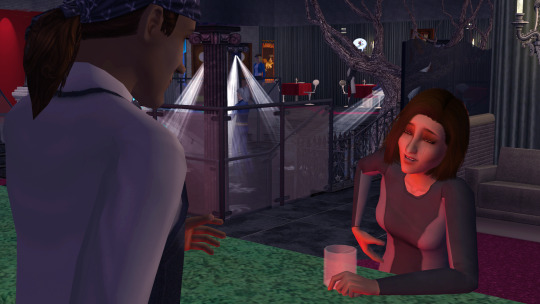
-Hey there, 17 year old girl, maybe you’ve had enough neat whiskey for the night? We’re actually running out of bottles.
-Beat it, ponytail, I need to dull my pain. I’ve just been stabbed right in the gut by the love of my life. Just like my style idol and general role model, space opera fascist Kylo Ren.
Shaj I really hate seeing you like this, and not just because the red neon light is super unflattering on your complexion.
-You can fuck right off too, I was perfectly happy with my dads who hate me and my imbecile sister and my brother who might as well not exist, noogie-ing people all day AND night long, but you had to be all ‘OMG IT’S SOPHIE MIGUEL SHAJAR GO TALK TO HER’. Life-ruining-moron.
But I was totally right about you two hitting it off, I mean look how sad you are now that she dumped- yea never mind, that’s not a good argument.
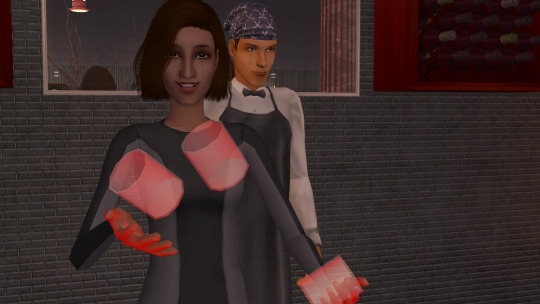
-Look what I can do even though I’ve had 46 whiskeys!! How you like me now, Sophie???
-You’re paying for all these broken glasses, I’m going to need your name and a credit card.
-Yes, fair enough, my name is Cyneswith Union-
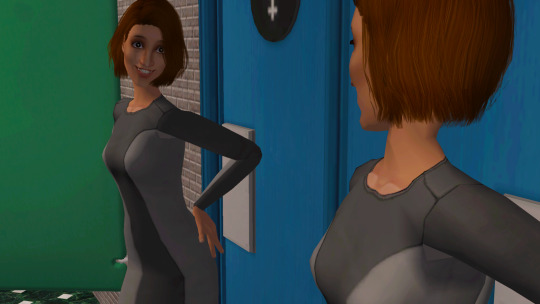
-I LOOK GOOD ENOUGH TO EAT
Yea, you really should eat something to soak up all the alcohol. And not to kick you when you’re down, but you should also disregard all those cliches about ~a smile being the most beautiful thing you can wear~ because MAN. Watch out Joaquin, there’s a new Joker on the prowl.
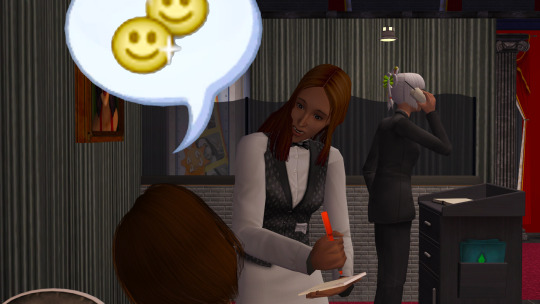
-So.. 20 lobsters thermidor and our most expensive appetizers?
-Aha.
-Would you mind settling your bill now?
-Of course not! My name is Cyneswith Union and this is the credit card my parents got me when I was 6 because we’re super duper best friends! I love my parents! They don’t care about their other daughter at all, even when their other daughter is going through a really hard time because she got the emotional equivalent of a lightsaber wound in the gut. You know what, let me also get 20 bottles of your most overpriced champagne to go with the lobsters.
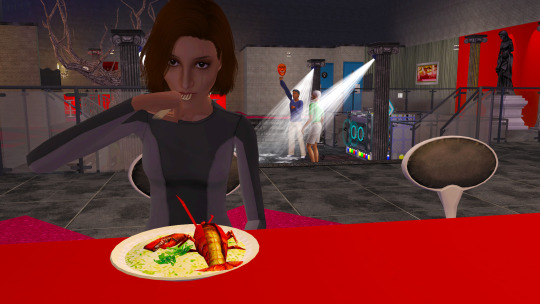
Feeling better?
-Well it’s hard to feel bad when you’re spending your parents’ money recklessly and with malice aforethought.
It sure is. Alright well, the sun is coming up, maybe we should head home.
-What’s the rush? What is going to happen if I don’t go home, my parents will get worried? LOL
God your life sucks. Ok let’s hit a couple more places.
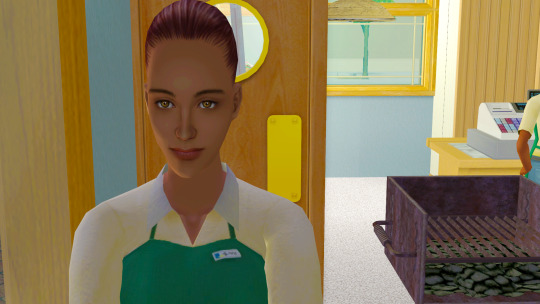
-Greetings. Welcome to our establishment. I am a human employee from this planet.
Great, nice to meet you.
-I just want there to be no doubt that I am indeed an earthling, born and raised under the earth’s exosphere and not above it.
Leave us alone.

-And I’m the resident community lot sim with that one face template you hate! There must be one of us on every lot you visit!
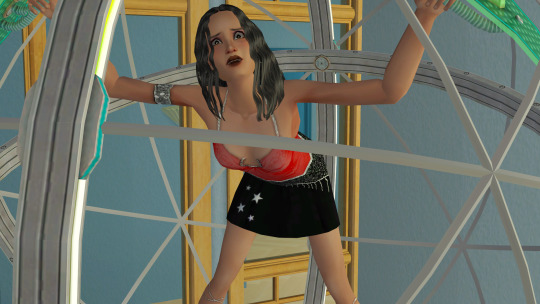
-And I am here in my revealing outfit to use the dance sphere and make everyone uncomfortable!
You’re actually pretty, I need to keep you in mind for after Don Oates takes a wrecking ball to our genetics, but yea, let’s bounce, Shajar.

Time to visit the happiest place on earth, Deh'Javu Modern Art Museum, home to my favorite piece of art in any medium, The Toilet of Fire. Shove that Fountain up your ass, Duchamp. How we feeling, Shaj?
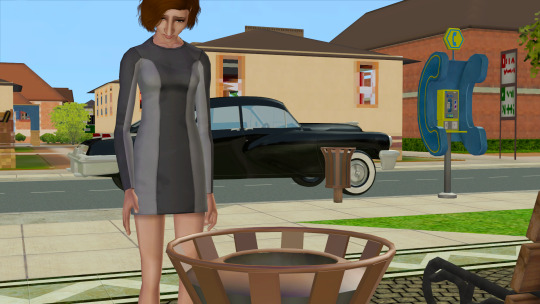
-This trash can reminds of Sophie :( She used to go around town throwing money she stole from charities in trash cans and then send them riddles for where to find them :(
Enough with Sophie, we’ll find you someone better! Like..
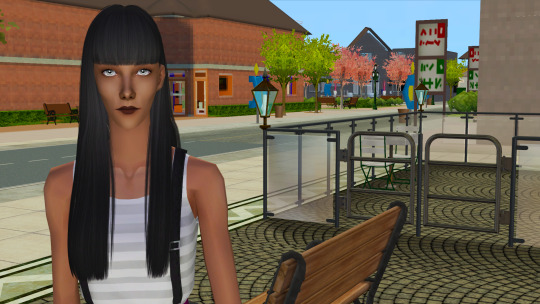
..your aunt! Get the hell out of here Brit Brit, you’re taking up townie space.
-I won’t be long, Gunther’s amazing close-up portrait of my hair was rejected by the museum so I’m here to set this shithole on fire.
In other words Gunther just painted a canvas black and called it a day?
-His art doesn’t cater to plebs. Yes, offense.
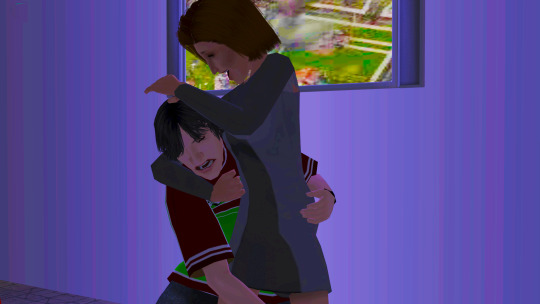
Our old friend Ugly Teen Townie is here so finally we can have some fun. Shajar had gone almost 12 hours(!) without noogieing someone and I was starting to worry for her health.
-Yes, yes, I’m starting to feel like myself again..
Good for you, Shaj!
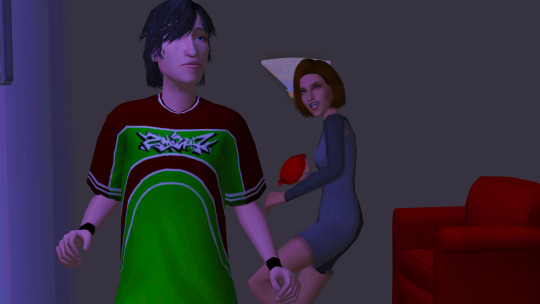
-Hope you’ve made peace with your God, Ugly Teen Townie, this water balloon is filled with horse feces!
-WHERE DID YOU EVEN GET HORSE SHIT
-I ordered it from some guy named Leod McGreggor.
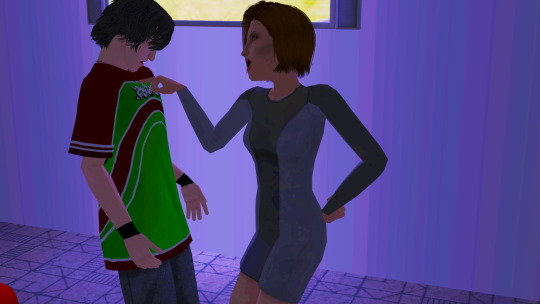
-How about a another joke, MuRRAY?
-What?!
-Now you say, ‘no, I think we’ve had enough of your jokes’. Say it!
-No, I think we’ve had enough of your jokes.
-What do you get when you cross a mentally-ill loner with a society that abandons him and treats him like trash? Now you say ‘call the police, Gene!’
-Call the police, Gene!
-I'll tell you what you get..

-YOU GET WHAT YOU FUCKING DESERVE. HAHA oh man! Good stuff.
Alright I’m starting to feel bad for Ugly Teen Townie, first he had to come to all the toddler birthday parties during the Victoria/Komei era and now this, he has suffered enough at this family’s hands. Time to go home, Shaj.

-Not so fast!
Wow, the Countess and Mrs. Crumplebottom on the same lot, top 10 anime crossovers.
-I have been sent here by the Limp Dick Vamps United organization to recruit Shajar Union.
Ugh you people are still around? Haven’t heard of you losers since the Count wouldn’t let Victoria bang him, which I’m still annoyed about.
-Indeed we are, and it’s clear Shajar is ready to join us, dedicating her life to evil deeds without romantic distractions. I have no idea what Crumplebottom is doing here.
-I’m here to recruit Shajar to my own organization, Bitter Sims Worldwide Alliance. We’re always on the lookout for new members who want to spread their misery to their fellow Sim.
It sounds like it’d be more effective if you guys just merged your organizations.
-I will NEVER merge my organization with someone who displays her bosom like a common whore.
-Eat a dick, Crumplebottom!
-MAKE ME, FANGTOOTH
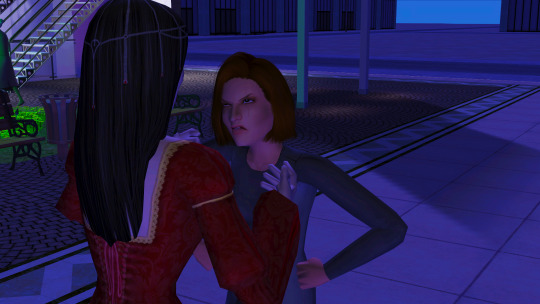
-Alright here I am, what the fuck do you want?
-Shajar, it is a pleasure to meet you! Ardent admirer of your work.
-What work, freakshow?
-Torturing everyone around you, what else!
-What? I don’t torture people around me, if anything they torture me.

-Why don’t you talk to me about it?
-I’d rather not, you look like a bejeweled snowman.
-Look deep into my eyes, Shajar..
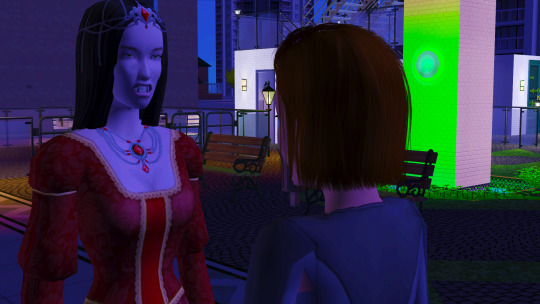
-And now look deep into my razor sharp teeth..
-Ugh fine, let’s talk.
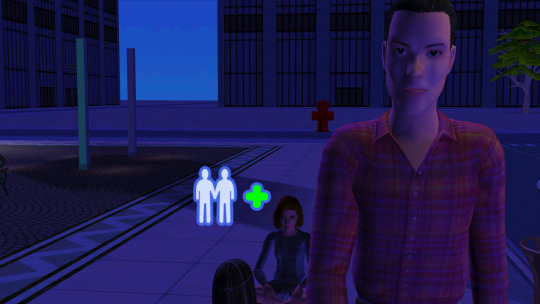
-Is that Victoria and Komei’s teen granddaughter hanging out with a vampire?
Yes it is Kennedy, keep it moving.
-God, wtf is wrong with this family.
Nothing now that you’ve been removed from our social circle, go away! Just kidding, you’re an icon and I’m marrying you in at some point.
-Hard pass.
Your loss, hombre.
-It definitely isn’t.
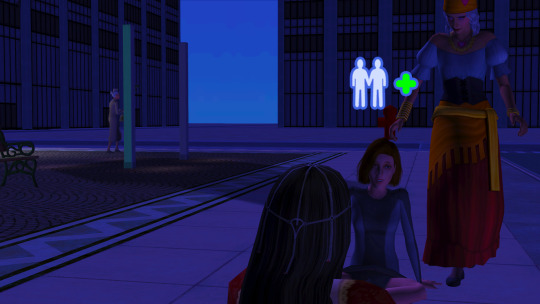
-If I had known your turn on was vampires I would had set you two up!
STOP SETTING UP TEENS WITH ADULTS, LAKSHMI. And Shajar’s turn ons isn’t vampires, it’s fitness/fatness. Body positive queen.
-Well, Shajar, you alphabetically listing all the people who have wronged you while I was trying to kill Crumplebottom telepathically has made for a very productive conversation. We’ll be in touch.
-Thanks, Countess, it’s been real.

Shajar!!! Who cares about Sophie when you might bag a hot, rich vamp??
-Meh.
I’m gonna need you to be more excited about this prospect because a vampire spouse might just be enough of a draw to beat the comedic factor of fucking Don Oates turning us into an unintentional uglacy and I’m doing whatever I can to avoid my fate.
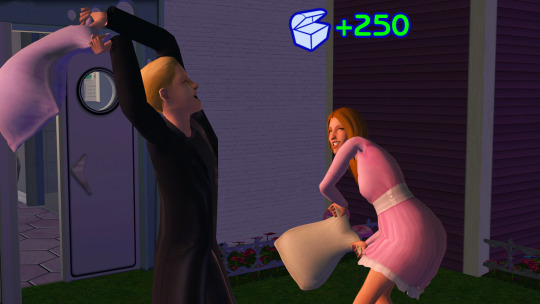
Ugh.

UGH

UGHHHHHHH
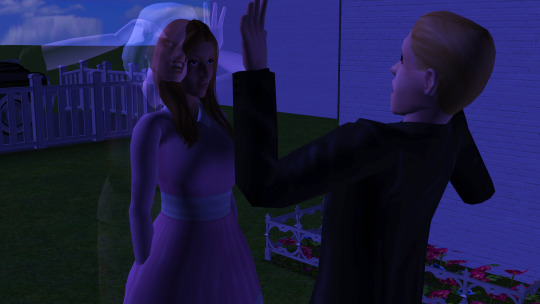
LMAOOOOOOOOOOOOO VICTORIA
-GET FUCKED, BROKEN FACED WEIRDO
God I miss you Vic 💔
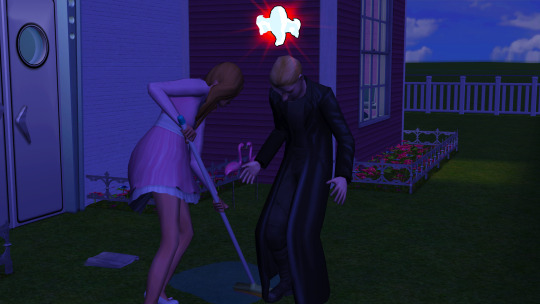
-Donnie-bear, not to be not-nice, but mopping your pee off my front lawn is not exactly what I pictured doing during this date.
This guy won’t even mop up his own piss, what a catch.
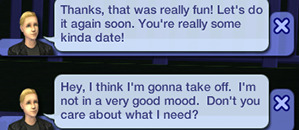
Wow, manipulative much?? You are a piss piece of work, Donaldo.
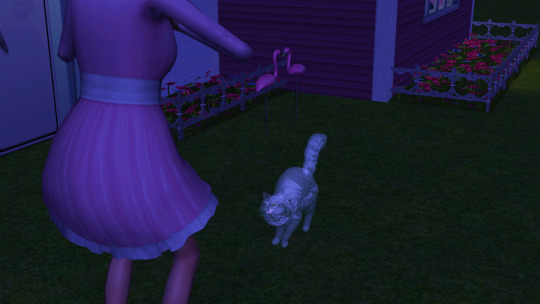
-Don’t think we forgot about you, you 10-nice-point disgrace!
-VICTOR NO
-GET THAT MOP READY
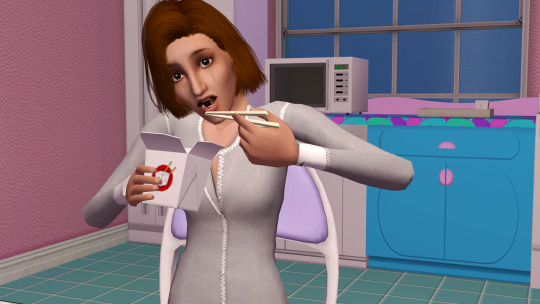
-Finally, some peace and quiet.. Just me, alone with my broken heart, pondering my hopeless, loveless future..
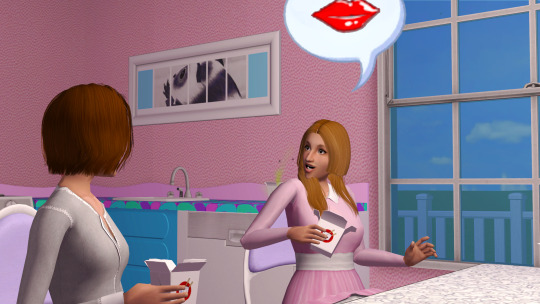
-💗💗💗OMG SIS THERE YOU ARE. DONNIE AND I MADE OUT!!! 💗💗💗 But then grandma’s ghost scared him into soiling himself.
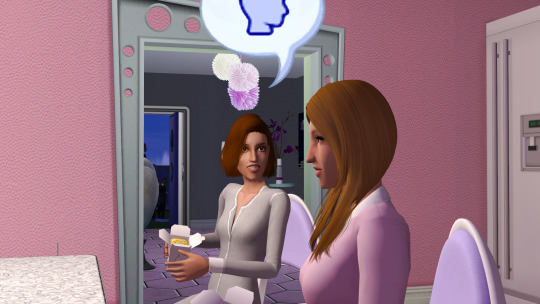
-Good for grandma, hopefully next time she gives him a stroke. Now shut up and let’s eat in silence while I ponder my hopeless, loveless future.
-Okie dokie! 💗💗💗
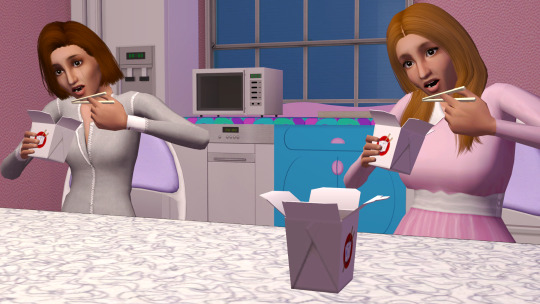
-Um, I think mine has vomit in it.
-Yea I did that, but it’s just whiskey and lobster, if anything it increased in value.
-Awww thanks sis! 💗💗💗
-Stop patronizing me, you little bitch. God I want to poke your eye out with this chopstick so badly.
-I love you too Shaj! 💗💗💗
And I hate both of you. Where’s your brother, I haven’t paid attention to him in 3 days.
-He went upstairs, I think he’s pusshurt we forgot his birthday LOL
IT’S HIS BIRTHDAY????
-Don’t feel bad, I forgot it too! 💗💗💗
GODDAMMIT. WULF! WULF WHERE ARE YOU
-I’m here, I just grew up and dare I say it could not have gone better!
Really?? Finally some good news! Let me look upon you-
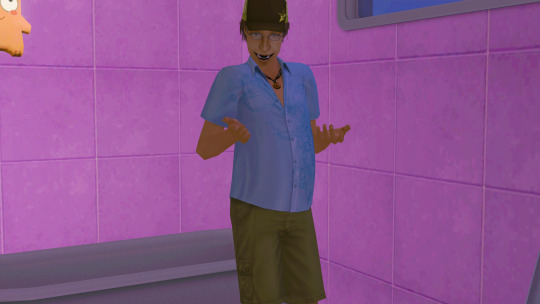
HAHAHAHAHAHAHAHAHAHAHAHAHA
AHAHAHAHAHHAHAHAHAHAHHAHAHAHAHA
WULF WHAT THE FUCK
-I was Mozart musical genius boy but now I’m a sk8ter boi! Character development!
Ok this is the most iconic birthday look since Gunther grew up in the pirate costume, we’re obviously keeping it.
-Great! And as if the fact I’m a Wyatt face template with 0 Jojo genes wasn’t enough to make me unelectable, I also rolled family! :D I’m doing everything I can to ensure I live that sweet motherlode spare life!
Honestly you should had picked another outfit cause now that you’re dressed like this I unironically want you to win. Hoisted with your own petard.
49 notes
·
View notes
Text
A self-indulgent spin off from @peachblossom-odyssey 's delightful AU, because we have been discussing the roles of some of the other characters in this world. Featuring tsundere dragon Elias, and world's greatest pirate Peter Lukas.
*
Elias stretched languorously as he woke, spreading out across the width of the bed. He would admit that his stretching was not quite as impressively lithe as it used to be, but it was difficult to recreate the powerful grace of a dragon in a human form. It was just one of those things he’d got used to, over the years.
He never would have slept on a feather mattress as a dragon, either, but the human body was soft, and sleeping on a hoard of magical artifacts and rare books was definitely hard on the human spine. One of many areas where his current shape was deficient, which also included the lack of wings, and the horrible inability to breathe fire at anyone who annoyed him. The opposable thumbs were nice, but they didn’t entirely compensate.
At least, he considered as he got up and began dressing, I still have my lair. A dragon’s lair was its entire sense of self, its history and dignity and pride, and in Elias’ current state, defending it against bandits, or so-called heroes, or even other dragons, would have been impossible. He kept a hefty length of metal piping at hand for emergencies, but he was realistic about its potential effectiveness.
Fortunately he hadn’t lost his capacity for illusion with his shape, and the mouth of the cave was utterly impossible to detect from outside. He was always careful when exiting and entering, so as not to give away the secret, and this morning was no exception. He looked cautiously around before walking through the curtain of glamor and out onto the beach. It was a beautiful summer’s morning, with the waves lapping gently on the golden sands, and the smell of salt lingering -
“There you are!” said a pleasant voice from behind him, and something came down over his head. Rough sackcloth, smelling of something chemical, something - something -
Elias’ last thought before losing consciousness was about the absolute indignity of having a bag put over his head.
He returned to the world slowly, groggy and with a pounding headache. Blinked his eyes open and stiffened as he took in his situation. He was tied to a chair, in a small, neat room. Judging from the porthole and the charts on the desk, a shipboard cabin. Abducted, then. And all his treasures looted, no doubt. He gave a low snarl under his breath, struggling against the ropes binding him (which, he noted, were oddly soft. And crimson red. Not the sort of rope you’d expect to find on a ship). If he only had his flames, or even his pipe -
“No point struggling,” came that same mellow voice from behind him. Elias craned to look over his shoulder (human necks were so short) and the man chuckled, walking around into view.
He was handsome, by human standards. Piercing blue eyes and graying hair, a short beard. Rugged features. Dressed in well made sailor’s garb, completed by a long, dark blue coat trimmed in silver. Elias smirked to himself. Just a human. He could talk his way out of this.
“There seems to have been some misunderstanding, Captain - ?”
“Lukas,” the man said. “Peter Lukas. And there’s no mistake, I’m afraid. So how about you stop playing games and show me that pretty tail, mermaid?”
Elias could think of at least two things wrong with that designation, right off the bat. He laughed.
“You’ve got the wrong man, Captain Lukas. One of the merfolk does frequent this bay, but I’m not him. The lack of gills probably should have tipped you off. And these.” He bared his teeth, human as the rest of him, square and white and utterly nonlethal.
Lukas looked at him with amused skepticism. Leaned in close and pulled open the collar of Elias’ shirt, which, really! Stroked his fingers roughly across the sheen of gold in the hollow of his throat.
“I know the merfolk can change their tails for legs when they choose,” he said. “These lovely scales tell the tale.”
Elias could hear the pun in his voice, and shuddered. He loathed this man, instantly and entirely.
“Well it’s hardly my problem if you can’t tell dragon scales from fish scales, is it?” he snapped.
Lukas’ eyes widened a little, and he whistled softly. Elias suddenly realized he’d made a rather obvious mistake. Damn this man for being so irritating.
“A dragon?” he murmured. “Is that so? I’ve never met a dragon before. I’d always heard they were bigger. And more intimidating than enthralling,’ he finished with a grin that was probably supposed to be seductive. Elias snorted.
“I should warn you,” he said, “If you’re planning to loot my lair, many of the pieces in my hoard are cursed. Be it on your head if you take them.”
It was true, and part of Elias hoped Lukas would take some of them. Particularly some of the more esoteric books in his collection. There was one from the Archwarlock Leitner titled On Vivisection that, well... Elias could certainly wish it upon this man.
To his surprise (and some offense) Peter Lukas laughed, his broad shoulders shaking and his blue eyes shining with mirth.
“I’m not interested in your hoard,” he said. “I’m the greatest pirate in the seven seas - I have enough wealth for a dozen lifetimes. But I am interested in how a dragon came to take human form. Chasing after a forbidden love, maybe?”
“Nothing so sentimental,” Elias told him, trying not to think about wealth for a dozen lifetimes. As a dragon, it was difficult not to fixate. “It’s a curse, and one I cannot wait to be rid of.”
That damn Gertrude Robinson, he’d thought her a mere librarian. How could he have known she was an immensely powerful mage beneath her drab, harmless exterior? Yes, he’d threatened to burn her library to the ground if she didn’t surrender its rarest books, but there had been no call to curse him this way. Until you appreciate the human experience, she'd said, and what a joke. Elias would never appreciate the human experience.
“I understand,” Lukas said, placing a hand to his heart. “I am under a curse of my own. Doomed to sail the seas eternally until I can find my one true love. That’s why they call me Lonely Captain Lukas, because from all the handsome lasses and comely lads who’ve tried to gain my favor, not one has captured my heart.”
Now it was Elias’ turn to laugh, and he did so heartily. The melodrama was almost ridiculous enough to be endearing, if he didn’t so thoroughly despise this man.
“So that’s why you’re seeking the merfolk, then?” he said at last. “You’ve heard that eating the tail from one of their kind can break any curse?”
“As have you, I’m sure, my fair dragon,” Peter said, inclining his head. Elias glowered at him.
“Indeed,” he said. “ Also, I have a name.”
“But you haven’t shared it with me,” Peter said with a smile. “And I know it’s impolite to ask a dragon their name. No matter how desperately you’d love to know it.”
“Perhaps you're not entirely uncouth,” Elias conceded grudgingly. “Untie me and I’ll tell you.”
“Of course!” Peter made quick work of the ropes with nimble, gentle fingers that told Elias he was accustomed to knotwork. Between that, and the velvety red texture, Elias wondered just precisely what Captain Lukas used the ropes in his cabin for.
Well, a promise was a promise.
“Elias,” he said shortly. He shrugged off the ropes and stood up, chafing his arms with a pretense of annoyance. Really, the ropes had been remarkably comfortable, and he hadn’t lost a modicum of circulation.
“Shame,” Peter said, “Those looked very nice on you, Elias.” He drew the word out like nectar on his tongue, his eyes traveling over Elias’ body with unabashed scrutiny. Elias tried to ignore the heat rising in his face. Dragons did not blush, just another indignity of this human form.
“If our business here is quite complete, I'll be going,” he said, slicking his hair back into order. The hair was one thing he did like about this form. It was soft and thick and enjoyable to run fingers through.
“I won't stop you,” Peter said, still looking over him with open admiration. “But I do wish you'd stay for dinner. My cook makes an exceptional Lobster Thermidor.”
Elias hesitated for an instant, because he really did love lobster. But draconic honor compelled him to be true to his intentions.
“Unfortunately, Captain - ”
“Peter, please.”
“Captain. As we're both hunting the singular merfolk who lives in this bay, it seems we're rivals. It wouldn't be appropriate to share a meal.”
Peter smiled at him, heated and hungry, and leaned across to open the cabin door. Waved Elias through with a chivalrous sweep.
“My men will take you back to shore of course,” he said. “But I think you're wrong about us being rivals. Now I've met you, my fair dragon, I feel I may not need a mermaid’s tail to break my curse.”
Elias stalked past him, head held high, refusing to give Peter the satisfaction of a reaction. How dare a mere human presume so with a dragon! When he got his flame back, he would burn Peter Lukas and his ship to ashes.
Until then, though, well...it was always pleasant to be admired. And only a dragon's due.
70 notes
·
View notes
Text
Against the Logic of the Guillotine: Why the Paris Commune Burned the Guillotine—and We Should Too
148 years ago this week, on April 6, 1871, armed participants in the revolutionary Paris Commune seized the guillotine that was stored near the prison in Paris. They brought it to the foot of the statue of Voltaire, where they smashed it into pieces and burned it in a bonfire, to the applause of an immense crowd.1 This was a popular action arising from the grassroots, not a spectacle coordinated by politicians. At the time, the Commune controlled Paris, which was still inhabited by people of all classes; the French and Prussian armies surrounded the city and were preparing to invade it in order to impose the conservative Republican government of Adolphe Thiers. In these conditions, burning the guillotine was a brave gesture repudiating the Reign of Terror and the idea that positive social change can be achieved by slaughtering people.
“What?” you say, in shock, “The Communards burned the guillotine? Why on earth would they do that? I thought the guillotine was a symbol of liberation!”
Why indeed? If the guillotine is not a symbol of liberation, then why has it become such a standard motif for the radical left over the past few years? Why is the internet replete with guillotine memes? Why does The Coup sing “We got the guillotine, you better run”? The most popular socialist periodical is named Jacobin, after the original proponents of the guillotine. Surely this can’t all be just an ironic sendup of lingering right-wing anxieties about the original French Revolution.
The guillotine has come to occupy our collective imagination. In a time when the rifts in our society are widening towards civil war, it represents uncompromising bloody revenge.
Those who take their own powerlessness for granted assume that they can promote gruesome revenge fantasies without consequences. But if we are serious about changing the world, we owe it to ourselves to make sure that our proposals are not equally gruesome.
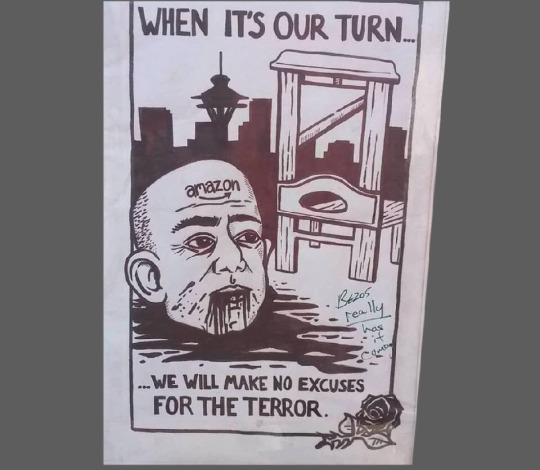
A poster in Seattle, Washington. The quotation is from Karl Marx.
Vengeance
It’s not surprising that people want bloody revenge today. Capitalist profiteering is rapidly rendering the planet uninhabitable. US Border Patrol is kidnapping, drugging, and imprisoning children. Individual acts of racist and misogynist violence occur regularly. For many people, daily life is increasingly humiliating and disempowering.
Those who don’t desire revenge because they are not compassionate enough to be outraged about injustice or because they are simply not paying attention deserve no credit for this. There is less virtue in apathy than in the worst excesses of vengefulness.
Do I want to take revenge on the police officers who murder people with impunity, on the billionaires who cash in on exploitation and gentrification, on the bigots who harass and dox people? Yes, of course I do. They have killed people I knew; they are trying to destroy everything I love. When I think about the harm that they are causing, I feel ready to break their bones, to kill them with my bare hands.
But that desire is distinct from my politics. I can want something without having to reverse-engineer a political justification for it. I can want something and choose not to pursue it, if I want something else even more—in this case, an anarchist revolution that is not based in revenge. I don’t judge other people for wanting revenge, especially if they have been through worse than I have. But I also don’t confuse that desire with a proposal for liberation.
If the sort of bloodlust I describe scares you, or if it simply seems unseemly, then you absolutely have no business joking about other people carrying out industrialized murder on your behalf.
For this is what distinguishes the fantasy of the guillotine: it is all about efficiency and distance. Those who fetishize the guillotine don’t want to kill people with their bare hands; they aren’t prepared to rend anyone’s flesh with their teeth. They want their revenge automated and carried out for them. They are like the consumers who blithely eat Chicken McNuggets but could never personally butcher a cow or cut down a rainforest. They prefer for bloodshed to take place in an orderly manner, with all the paperwork filled out properly, according to the example set by the Jacobins and the Bolsheviks in imitation of the impersonal functioning of the capitalist state.
And one more thing: they don’t want to have to take responsibility for it. They prefer to express their fantasy ironically, retaining plausible deniability. Yet anyone who has ever participated actively in social upheaval knows how narrow the line can be between fantasy and reality. Let’s look at the “revolutionary” role the guillotine has played in the past.
“But revenge is unworthy of an anarchist! The dawn, our dawn, claims no quarrels, no crimes, no lies; it affirms life, love, knowledge; we work to hasten that day.”
-Kurt Gustav Wilckens—anarchist, pacifist, and assassin of Colonel Héctor Varela, the Argentine official who had overseen the slaughter of approximately 1500 striking workers in Patagonia.
A Very Brief History of the Guillotine
The guillotine is associated with radical politics because it was used in the original French Revolution to behead monarch Louis XVI on January 21, 1793, several months after his arrest. But once you open the Pandora’s box of exterminatory force, it’s difficult to close it again.
Having gotten started using the guillotine as an instrument of social change, Maximilien de Robespierre, sometime President of the Jacobin Club, continued employing it to consolidate power for his faction of the Republican government. As is customary for demagogues, Robespierre, Georges Danton, and other radicals availed themselves of the assistance of the sans-culottes, the angry poor, to oust the more moderate faction, the Girondists, in June 1793. (The Girondists, too, were Jacobins; if you love a Jacobin, the best thing you can do for him is to prevent his party from coming to power, since he is certain to be next up against the wall after you.) After guillotining the Girondists en masse, Robespierre set about consolidating power at the expense of Danton, the sans-culottes, and everyone else.
“The revolutionary government has nothing in common with anarchy. On the contrary, its goal is to suppress it in order to ensure and solidify the reign of law.”
-Maximilien Robespierre, distinguishing his autocratic government from the more radical grassroots movements that helped to create the French Revolution.2
By early 1794, Robespierre and his allies had sent a great number of people at least as radical as themselves to the guillotine, including Anaxagoras Chaumette and the so-called Enragés, Jacques Hébert and the so-called Hébertists, proto-feminist and abolitionist Olympe de Gouges, Camille Desmoulins (who had had the gall to suggest to his childhood friend Robespierre that “love is stronger and more lasting than fear”)—and Desmoulins’s wife, for good measure, despite her sister having been Robespierre’s fiancée. They also arranged for the guillotining of Georges Danton and Danton’s supporters, alongside various other former allies. To celebrate all this bloodletting, Robespierre organized the Festival of the Supreme Being, a mandatory public ceremony inaugurating an invented state religion.3
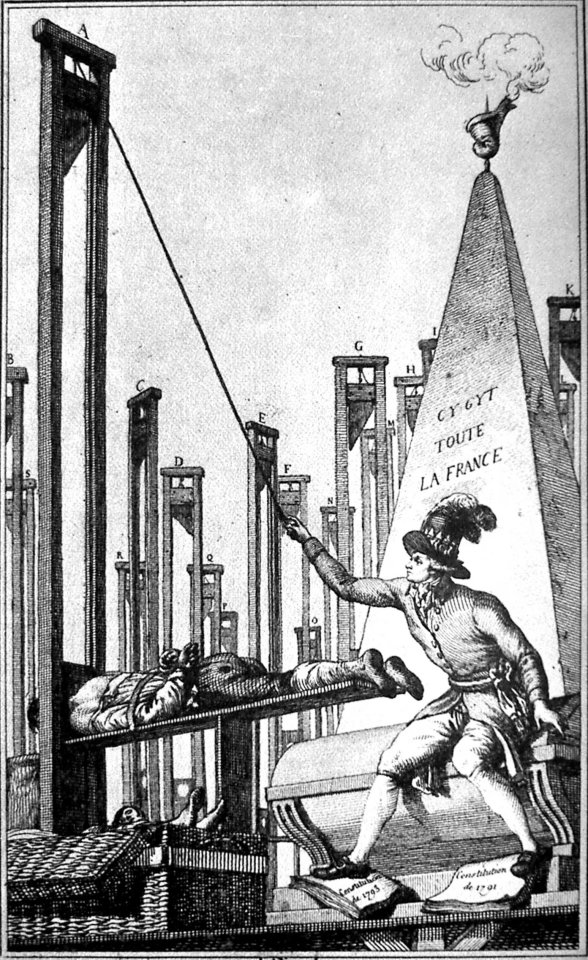
“Here lies all of France,” reads the inscription on the tomb behind Robespierre in this political cartoon referencing all the executions he helped arrange.
After this, it was only a month and a half before Robespierre himself was guillotined, having exterminated too many of those who might have fought beside him against the counterrevolution. This set the stage for a period of reaction that culminated with Napoleon Bonaparte seizing power and crowning himself Emperor. According to the French Republican Calendar (an innovation that did not catch on, but was briefly reintroduced during the Paris Commune), Robespierre’s execution took place during the month of Thermidor. Consequently, the name Thermidor is forever associated with the onset of the counterrevolution.
“Robespierre killed the Revolution in three blows: the execution of Hébert, the execution of Danton, the Cult of the Supreme Being… The victory of Robespierre, far from saving it, would have meant only a more profound and irreparable fall.”
-Louis-Auguste Blanqui, himself hardly an opponent of authoritarian violence.
But it is a mistake to focus on Robespierre. Robespierre himself was not a superhuman tyrant. At best, he was a zealous apparatchik who filled a role that countless revolutionaries were vying for, a role that another man would have played if he had not. The issue was systemic—the competition for centralized dictatorial power—not a matter of individual wrongdoing.
The tragedy of 1793-1795 confirms that whatever tool you use to bring about a revolution will surely be used against you. But the problem is not just the tool, it’s the logic behind it. Rather than demonizing Robespierre—or Lenin, Stalin, or Pol Pot—we have to examine the logic of the guillotine.
To a certain extent, we can understand why Robespierre and his contemporaries ended up relying on mass murder as a political tool. They were threatened by foreign invasion, internal conspiracies, and counterrevolutionary uprisings; they were making decisions in an extremely high-stress environment. But if it is possible to understand how they came to embrace the guillotine, it is impossible to argue that all the killings were necessary to secure their position. Their own executions refute that argument eloquently enough.
Likewise, it is wrong to imagine that the guillotine was employed chiefly against the ruling class, even at the height of Jacobin rule. Being consummate bureaucrats, the Jacobins kept detailed records. Between June 1793 and the end of July 1794, 16,594 people were officially sentenced to death in France, including 2639 people in Paris. Of the formal death sentences passed under the Terror, only 8 percent were doled out to aristocrats and 6 percent to members of the clergy; the rest were divided between the middle class and the poor, with the vast majority of the victims coming from the lower classes.
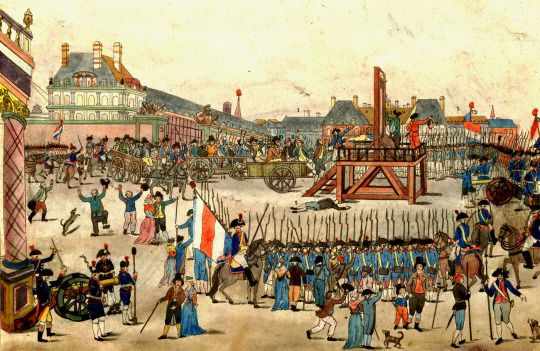
The execution of Robespierre and his colleagues. Robespierre is identified by the number 10; sitting in the cart, he holds a handkerchief to his mouth, having been shot in the jaw during his capture.
The story that played out in the first French revolution was not a fluke. Half a century later, the French Revolution of 1848 followed a similar trajectory. In February, a revolution led by angry poor people gave Republican politicians state power; in June, when life under the new government turned out to be little better than life under the king, the people of Paris revolted once again and the politicians ordered the army to massacre them in the name of the revolution. This set the stage for the nephew of the original Napoleon to win the presidential election of December 1848, promising to “restore order.” Three years later, having exiled all the Republican politicians, Napoleon III abolished the Republic and crowned himself Emperor—prompting Marx’s famous quip that history repeats itself, “the first time as tragedy, the second time as farce.”
Likewise, after the French revolution of 1870 put Adolphe Thiers in power, he ruthlessly butchered the Paris Commune, but this only paved the way for even more reactionary politicians to supplant him in 1873. In all three of these cases, we see how revolutionaries who are intent on wielding state power must embrace the logic of the guillotine to acquire it, and then, having brutally crushed other revolutionaries in hopes of consolidating control, are inevitably defeated by more reactionary forces.
In the 20th century, Lenin described Robespierre as a Bolshevik avant la lettre, affirming the Terror as an antecedent of the Bolshevik project. He was not the only person to draw that comparison.
“We’ll be our own Thermidor,” Bolshevik apologist Victor Serge recalls Lenin proclaiming as he prepared to butcher the rebels of Kronstadt. In other words, having crushed the anarchists and everyone else to the left of them, the Bolsheviks would survive the reaction by becoming the counterrevolution themselves. They had already reintroduced fixed hierarchies into the Red Army in order to recruit former Tsarist officers to join it; alongside their victory over the insurgents in Kronstadt, they reintroduced the free market and capitalism, albeit under state control. Eventually Stalin assumed the position once occupied by Napoleon.
So the guillotine is not an instrument of liberation. This was already clear in 1795, well over a century before the Bolsheviks initiated their own Terror, nearly two centuries before the Khmer Rouge exterminated almost a quarter of the population of Cambodia.
Why, then, has the guillotine come back into fashion as a symbol of resistance to tyranny? The answer to this will tell us something the psychology of our time.
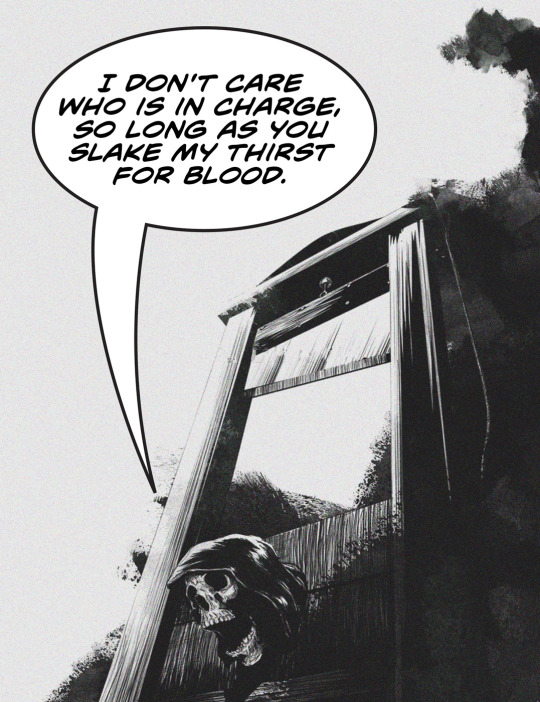
Fetishizing the Violence of the State
It is shocking that even today, radicals would associate themselves with the Jacobins, a tendency that was reactionary by the end of 1793. But the explanation isn’t hard to work out. Then, as now, there are people who want to think of themselves as radical without having to actually make a radical break with the institutions and practices that are familiar to them. “The tradition of all dead generations weighs like a nightmare on the brains of the living,” as Marx said.
If—to use Max Weber’s famous definition—an aspiring government qualifies as representing the state by achieving a monopoly on the legitimate use of physical force within a given territory, then one of the most persuasive ways it can demonstrate its sovereignty is to wield lethal force with impunity. This explains the various reports to the effect that public beheadings were observed as festive or even religious occasions during the French Revolution. Before the Revolution, beheadings were affirmations of the sacred authority of the monarch; during the Revolution, when the representatives of the Republic presided over executions, this confirmed that they held sovereignty—in the name of The People, of course. “Louis must die so that the nation may live,” Robespierre had proclaimed, seeking to sanctify the birth of bourgeois nationalism by literally baptizing it in the blood of the previous social order. Once the Republic was inaugurated on these grounds, it required continuous sacrifices to affirm its authority.
Here we see the essence of the state: it can kill, but it cannot give life. As the concentration of political legitimacy and coercive force, it can do harm, but it cannot establish the kind of positive freedom that individuals experience when they are grounded in mutually supportive communities. It cannot create the kind of solidarity that gives rise to harmony between people. What we use the state to do to others, others can use the state to do to us—as Robespierre experienced—but no one can use the coercive apparatus of the state for the cause of liberation.
For radicals, fetishizing the guillotine is just like fetishizing the state: it means celebrating an instrument of murder that will always be used chiefly against us.
Those who have been stripped of a positive relationship to their own agency often look around for a surrogate to identify with—a leader whose violence can stand in for the revenge they desire as a consequence of their own powerlessness. In the Trump era, we are all well aware of what this looks like among disenfranchised proponents of far-right politics. But there are also people who feel powerless and angry on the left, people who desire revenge, people who want to see the state that has crushed them turned against their enemies.
Reminding “tankies” of the atrocities and betrayals state socialists perpetrated from 1917 on is like calling Trump racist and sexist. Publicizing the fact that Trump is a serial sexual assaulter only made him more popular with his misogynistic base; likewise, the blood-drenched history of authoritarian party socialism can only make it more appealing to those who are chiefly motivated by the desire to identify with something powerful.
-Anarchists in the Trump Era
Now that the Soviet Union has been defunct for almost 30 years—and owing to the difficulty of receiving firsthand perspectives from the exploited Chinese working class—many people in North America experience authoritarian socialism as an entirely abstract concept, as distant from their lived experience as mass executions by guillotine. Desiring not only revenge but also a deus ex machina to rescue them from both the nightmare of capitalism and the responsibility to create an alternative to it themselves, they imagine the authoritarian state as a champion that could fight on their behalf. Recall what George Orwell said of the comfortable British Stalinist writers of the 1930s in his essay “Inside the Whale”:
“To people of that kind such things as purges, secret police, summary executions, imprisonment without trial etc., etc., are too remote to be terrifying. They can swallow totalitarianism because they have no experience of anything except liberalism.”
Punishing the Guilty
“Trust visions that don’t feature buckets of blood.”
-Jenny Holzer
By and large, we tend to be more aware of the wrongs committed against us than we are of the wrongs we commit against others. We are most dangerous when we feel most wronged, because we feel most entitled to pass judgment, to be cruel. The more justified we feel, the more careful we ought to be not to replicate the patterns of the justice industry, the assumptions of the carceral state, the logic of the guillotine. Again, this does not justify inaction; it is simply to say that we must proceed most critically precisely when we feel most righteous, lest we assume the role of our oppressors.
When we see ourselves as fighting against specific human beings rather than social phenomena, it becomes more difficult to recognize the ways that we ourselves participate in those phenomena. We externalize the problem as something outside ourselves, personifying it as an enemy that can be sacrificed to symbolically cleanse ourselves. Yet what we do to the worst of us will eventually be done to the rest of us.
As a symbol of vengeance, the guillotine tempts us to imagine ourselves standing in judgment, anointed with the blood of the wicked. The Christian economics of righteousness and damnation is essential to this tableau. On the contrary, if we use it to symbolize anything, the guillotine should remind us of the danger of becoming what we hate. The best thing would be to be able to fight without hatred, out of an optimistic belief in the tremendous potential of humanity.
Often, all it takes to be able to cease to hate a person is to succeed in making it impossible for him to pose any kind of threat to you. When someone is already in your power, it is contemptible to kill him. This is the crucial moment for any revolution, the moment when the revolutionaries have the opportunity to take gratuitous revenge, to exterminate rather than simply to defeat. If they do not pass this test, their victory will be more ignominious than any failure.
The worst punishment anyone could inflict on those who govern and police us today would be to compel them to live in a society in which everything they’ve done is regarded as embarrassing—for them to have to sit in assemblies in which no one listens to them, to go on living among us without any special privileges in full awareness of the harm they have done. If we fantasize about anything, let us fantasize about making our movements so strong that we will hardly have to kill anyone to overthrow the state and abolish capitalism. This is more becoming of our dignity as partisans of liberation.
It is possible to be committed to revolutionary struggle by all means necessary without holding life cheap. It is possible to eschew the sanctimonious moralism of pacifism without thereby developing a cynical lust for blood. We need to develop the ability to wield force without ever mistaking power over others for our true objective, which is to collectively create the conditions for the freedom of all.
“That humanity might be redeemed from revenge: that is for me the bridge to the highest hope and a rainbow after lashing storms.”
-Friedrich Nietzsche (not himself a partisan of liberation, but one of the foremost theorists of the hazards of vengefulness)
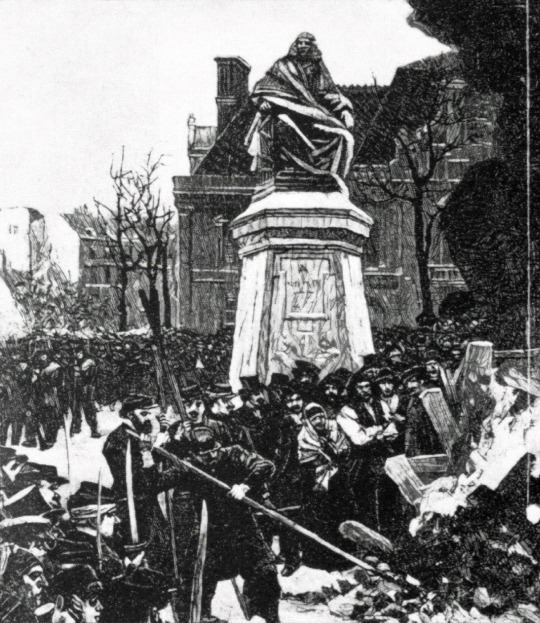
Communards burning the guillotine as a “servile instrument of monarchist domination” at the foot of the statue of Voltaire in Paris on April 6, 1871.
Instead of the Guillotine
Of course, it’s pointless to appeal to the better nature of our oppressors until we have succeeded in making it impossible for them to benefit from oppressing us. The question is how to accomplish that.
Apologists for the Jacobins will protest that, under the circumstances, at least some bloodletting was necessary to advance the revolutionary cause. Practically all of the revolutionary massacres in history have been justified on the grounds of necessity—that’s how people always justify massacres. Even if some bloodletting were necessary, that it is still no excuse to cultivate bloodlust and entitlement as revolutionary values. If we wish to wield coercive force responsibly when there is no other choice, we should cultivate a distaste for it.
Have mass killings ever helped us advance our cause? Certainly, reactionaries throughout history have disingenuously held revolutionaries to a double standard, forgiving the state for murdering civilians by the million while taking insurgents to task for so much as breaking a window. But as we seek transformation rather than conquest, we should appraise our victories according to a different logic than the police and militaries we confront.
This is not an argument against the use of force. Rather, it is a question about how to employ it without creating new hierarchies, new forms of systematic oppression.
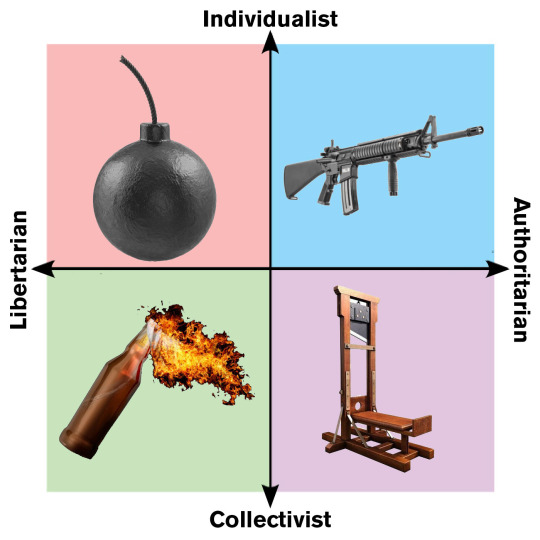
A taxonomy of revolutionary violence.
The image of the guillotine is propaganda for the kind of authoritarian organization that can avail itself of that particular tool. Every tool implies the forms of social organization that are necessary to employ it. In his memoir, Bash the Rich, Class War veteran Ian Bone quotes Angry Brigade member John Barker to the effect that “petrol bombs are far more democratic than dynamite,” suggesting that we should analyze every tool of resistance in terms of how it structures power. Critiquing the armed struggle model adopted by hierarchical authoritarian groups in Italy in the 1970s, Alfredo Bonanno and other insurrectionists emphasized that liberation could only be achieved via horizontal, decentralized, and participatory methods of resistance.
“It is impossible to make the revolution with the guillotine alone. Revenge is the antechamber of power. Anyone who wants to avenge themselves requires a leader. A leader to take them to victory and restore wounded justice.”
-Alfredo Bonanno, Armed Joy
Together, a rioting crowd can defend an autonomous zone or exert pressure on authorities without need of hierarchical centralized leadership. Where this becomes impossible—when society has broken up into two distinct sides that are fully prepared to slaughter each other via military means—one may no longer speak of revolution, but only of war. The premise of revolution is that subversion can spread across the lines of enmity, destabilizing fixed positions, undermining the allegiances and assumptions that underpin authority. We should never hurry to make the transition from revolutionary ferment to warfare. Doing so usually forecloses possibilities rather than expanding them.
As a tool, the guillotine takes for granted that it is impossible to transform one’s relations with the enemy, only to abolish them. What’s more, the guillotine assumes that the victim is already completely within the power of the people who employ it. By contrast with the feats of collective courage we have seen people achieve against tremendous odds in popular uprisings, the guillotine is a weapon for cowards.
By refusing to slaughter our enemies wholesale, we hold open the possibility that they might one day join us in our project of transforming the world. Self-defense is necessary, but wherever we can, we should take the risk of leaving our adversaries alive. Not doing so guarantees that we will be no better than the worst of them. From a military perspective, this is a handicap; but if we truly aspire to revolution, it is the only way.
Liberate, not Exterminate
“To give hope to the many oppressed and fear to the few oppressors, that is our business; if we do the first and give hope to the many, the few must be frightened by their hope. Otherwise, we do not want to frighten them; it is not revenge we want for poor people, but happiness; indeed, what revenge can be taken for all the thousands of years of the sufferings of the poor?”
-William Morris, “How We Live and How We Might Live”
So we repudiate the logic of the guillotine. We don’t want to exterminate our enemies. We don’t think the way to create harmony is to subtract everyone who does not share our ideology from the world. Our vision is a world in which many worlds fit, as Subcomandante Marcos put it—a world in which the only thing that is impossible is to dominate and oppress.
Anarchism is a proposal for everyone regarding how we might go about improving our lives—workers and unemployed people, people of all ethnicities and genders and nationalities or lack thereof, paupers and billionaires alike. The anarchist proposal is not in the interests of one currently existing group against another: it is not a way to enrich the poor at the expense of the rich, or to empower one ethnicity, nationality, or religion at others’ expense. That entire way of thinking is part of what we are trying to escape. All of the “interests” that supposedly characterize different categories of people are products of the prevailing order and must be transformed along with it, not preserved or pandered to.
From our perspective, even the topmost positions of wealth and power that are available in the existing order are worthless. Nothing that capitalism and the state have to offer are of any value to us. We propose anarchist revolution on the grounds that it could finally fulfill longings that the prevailing social order will never satisfy: the desire to be able to provide for oneself and one’s loved ones without doing so at anyone else’s expense, the wish to be valued for one’s creativity and character rather than for how much profit one can generate, the longing to structure one’s life around what is profoundly joyous rather than according to the imperatives of competition.
We propose that everyone now living could get along—if not well, then at least better—if we were not forced to compete for power and resources in the zero-sum games of politics and economics.
Leave it to anti-Semites and other bigots to describe the enemy as a type of people, to personify everything they fear as the Other. Our adversary is not a kind of human being, but the form of social relations that imposes antagonism between people as the fundamental model for politics and economics. Abolishing the ruling class does not mean guillotining everyone who currently owns a yacht or penthouse; it means making it impossible for anyone to systematically wield coercive power over anyone else. As soon as that is impossible, no yacht or penthouse will sit empty long.
As for our immediate adversaries—the specific human beings who are determined to maintain the prevailing order at all costs—we aspire to fight against them without seeking to exterminate them. However selfish and rapacious they appear, at least some of their values are similar to ours, and most of their errors—like our own—arise from their fears and weaknesses. In many cases, they oppose our proposals precisely because of what is internally inconsistent in them—for example, the idea of bringing about the fellowship of humanity by means of violent coercion. Were it not for the genuinely egregious things that have been done in the name of liberation, our enemies would have much weaker arguments against it.
Even when we are engaged in pitched physical struggles with our adversaries, we ought to maintain a profound faith in their potential, for we hope to live in different relations with them one day. As aspiring revolutionaries, this hope is our most precious resource, the foundation of everything we do. If revolutionary transformation is to spread throughout society and across the world, those we fight today will have to be fighting alongside us tomorrow. We do not preach conversion by the sword, nor do we imagine that we will persuade our adversaries in some abstract marketplace of ideas; rather, we aim to interrupt the ways that capitalism and the state currently reproduce themselves while demonstrating the virtues of our alternative inclusively and contagiously. There are no shortcuts when it comes to revolution.
Precisely because it is sometimes necessary to employ force in our conflicts with those who preserve the prevailing order, it is especially important that we never lose sight of our aspirations, our compassion, and our optimism. When we are compelled to use coercive force in the struggle, the only possible justification for doing so is that it is a necessary step towards creating a better world for everyone—including our enemies, or at least their children. Otherwise, we risk becoming the next ones to operate the guillotine.
“The only real revenge we could possibly have would be by our own efforts to bring ourselves to happiness.”
-William Morris, in response to calls for revenge for police attacks on demonstrations in Trafalgar Square
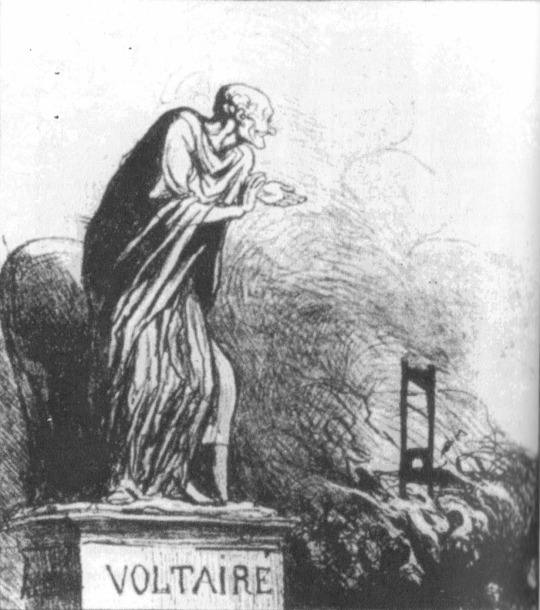
Voltaire applauding the burning the guillotine during the Paris Commune.
Appendix: The Beheaded
The guillotine did not end its career with the conclusion of the first French Revolution, nor when it was burned during the Paris Commune. In fact, it was used in France as a means for the state to carry out capital punishment right up to 1977. One of the last women guillotined in France was executed for providing abortions. The Nazis guillotined about 16,500 people between 1933 and 1945—the same number of people killed during the peak of the Terror in France.
A few victims of the guillotine:
Ravachol (born François Claudius Koenigstein), anarchist
Auguste Vaillant, anarchist
Emile Henry, anarchist
Sante Geronimo Caserio, anarchist
Raymond Caillemin, Étienne Monier and André Soudy, all anarchist participants in the so-called Bonnot Gang
Mécislas Charrier, anarchist
Felice Orsini, who attempted to assassinate Napoleon III
Hans and Sophie Scholl and Christoph Probst—members of Die Weisse Rose, an underground anti-Nazi youth organization active in Munich 1942-1943.
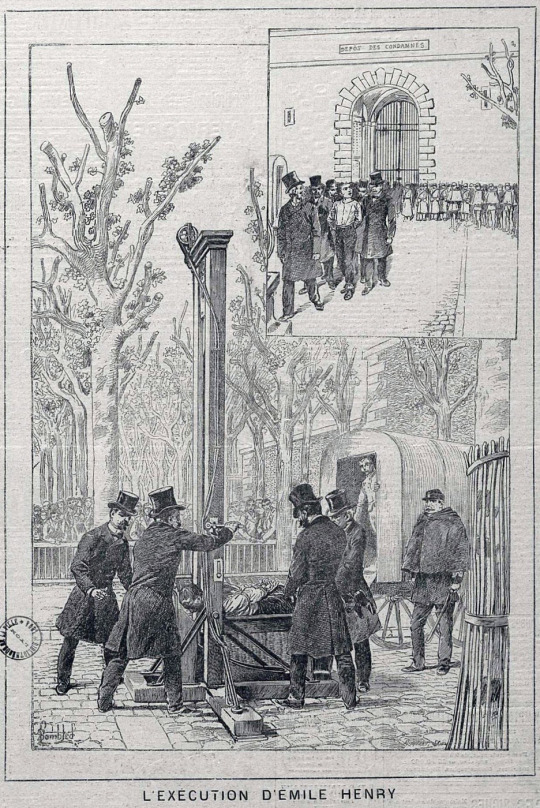
Emile Henry.
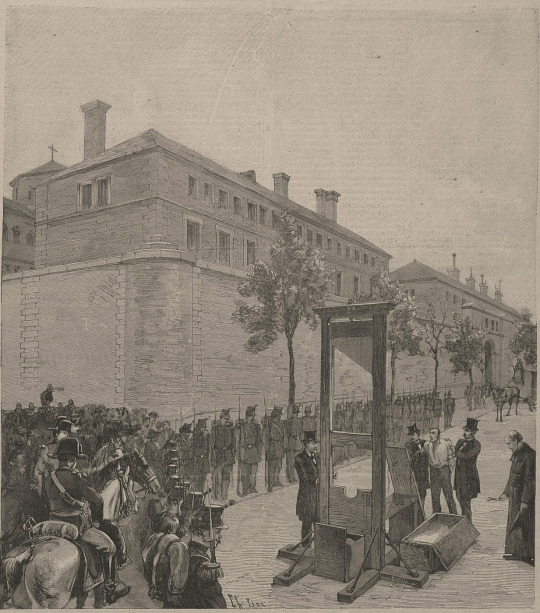
Sante Geronimo Caserio.
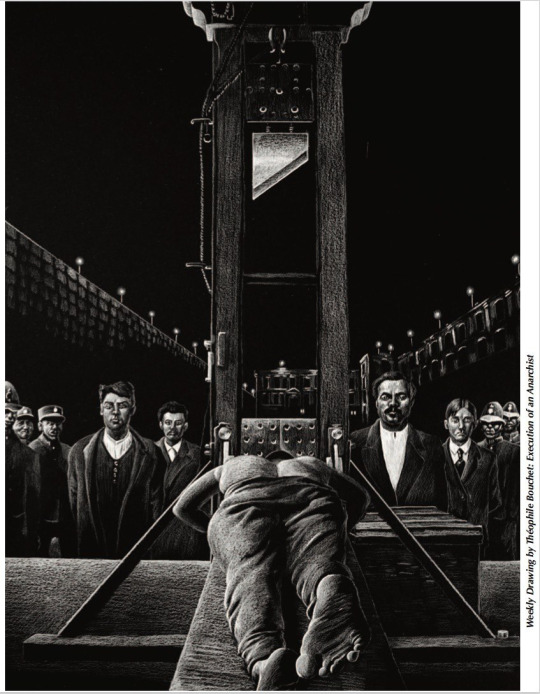
André Soudy, Edouard Carouy, Octave Garnier, Etienne Monier.
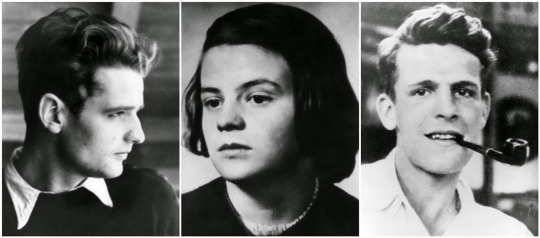
Hans and Sophie Scholl and Christoph Probst.
“I am an anarchist. We have been hanged in Chicago, electrocuted in New York, guillotined in Paris and strangled in Italy, and I will go with my comrades. I am opposed to your Government and to your authority. Down with them. Do your worst. Long live Anarchy.”
-Chummy Fleming
Further Reading
The Guillotine At Work, GP Maximoff
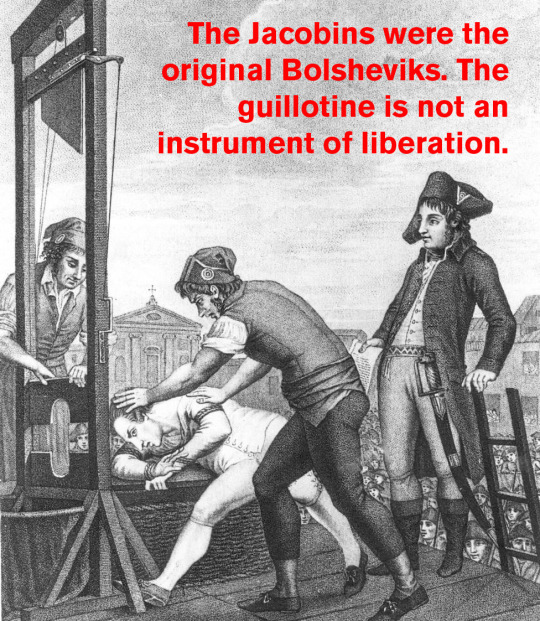
As reported in the official journal of the Paris Commune:
“On Thursday, at nine o’clock in the morning, the 137th battalion, belonging to the eleventh arrondissement, went to Rue Folie-Mericourt; they requisitioned and took the guillotine, broke the hideous machine into pieces, and burned it to the applause of an immense crowd.
“They burned it at the foot of the statue of the defender of Sirven and Calas, the apostle of humanity, the precursor of the French Revolution, at the foot of the statue of Voltaire.”
This had been announced earlier in the following proclamation:
“Citizens,
“We have been informed of the construction of a new type of guillotine that was commissioned by the odious government [i.e., the conservative Republican government under Adolphe Thiers]—one that it is easier to transport and speedier. The Sub-Committee of the 11th Arrondissement has ordered the seizure of these servile instruments of monarchist domination and has voted that they be destroyed once and forever. They will therefore be burned at 10 o’clock on April 6, 1871, on the Place de la Mairies, for the purification of the Arrondissement and the consecration of our new freedom.” ↩
As we have argued elsewhere, fetishizing “the rule of law” often serves to legitimize atrocities that would otherwise be perceived as ghastly and unjust. History shows again and again how centralized government can perpetrate violence on a much greater scale than anything that arises in “unorganized chaos.” ↩
Nauseatingly, at least one contributor to Jacobin magazine has even attempted to rehabilitate this precursor to the worst excesses of Stalinism, pretending that a state-mandated religion could be preferable to authoritarian atheism. The alternative to both authoritarian religions and authoritarian ideologies that promote Islamophobia and the like is not for an authoritarian state to impose a religion of its own, but to build grassroots solidarity across political and religious lines in defense of freedom of conscience. ↩
49 notes
·
View notes
Text
fanfiction: to be between two religions
title: to be between two religions
fandom: Les Misérables
rating: general/teen
relationships/characters: Enjolras/Marius; Marius, Enjolras
word count: 4,660
keywords/tags: Swimming, Canon Era, Enjolras Has Feelings, Awkward Marius, Physical Fitness as Bonapartist Democrat Praxis
summary:
Early one morning, Marius Pontmercy attends the swimming school where Enjolras is a regular.
notes: written for AO3 user CharlesLindberg for the 2019 Chocolate Box exchange.
{read two religions on AO3} {read two religions on Dreamwidth}
Marius is in a daze in the dressing room, in the showers, as he walks from that cloister of dry rooms to the lukewarm and humid area of pool facility.
His visit to the swimming school this morning marks the return of a habit he had many months before discarded: owing to his obligations — concerns at the publishing house which had drawn him from his reveries, forced him to work more than he was inclined — he has not slept properly in some days, and if the years of his adolescence are to be any evidence, the physical exertion of swimming never fails to rejuvenate and reset his body to its natural state. Besides that, newfound independence, penniless independence at that, distracted him from his old routines; he has neglected his body in favor of his mind. But he is here again, and has resolved to continue to be here even on days when it is not strictly necessary to wake him up. Courfeyrac was generous in giving him the sous to spend his morning bathing, indeed, he gave enough for a month's worth of patronage; he does not wish for the loan to be in vain.
(A year ago he would not have accepted a loan at all.)
Once he is in the water he feels momentarily as though he does not remember how he became so, but ducking under solves this problem, and then he is able to attempt once more that rhythm of the arms and legs which is only possible for a man submerged.
The first thirty meters are slow; on the second length he goes a little faster. The third and fourth are taxing, and when he nears the side of the pool where he started, he realizes that in his absence he has forgotten how to properly breathe.
A queue has formed at the end of the lane, in the shallow end. He surfaces to join it, treading water, bobbing: the floor is just enough inches beneath him that he is underwater entirely if he tries to stand upon it.
"Marius Pontmercy?"
In a careful balance, Marius tilts his head sideways to press the water out of his ear, presses his curly wet hair back from his forehead with the heel of his palm. The length is growing bothersome, but with all his distractions he has not yet seen to a barber. Now that he is attempting swimming practise, he is more cognizant of that necessity.
If he remembers, he'll ask Courfeyrac about it later.
"Marius Pontmercy."
He remains in place, another point in the line of swimmers. No one knows him, here, so whatever voice is saying his name must be an imagined one. It does sound a little familiar, but all imaginary voices must; it is not so uncommon to hear one's name amongst a din of human speech. Sound in the natatory room echoes.
Something brushes against his knee under the water, and he flinches.
Then he blinks. The something was someone, and the someone was saying his name indeed. It is Enjolras, Courfeyrac's friend, who is before him now. Marius feels blood rush to his cheeks: in recent months he has spent plenty of time with Courfeyrac, some even with L'Aigle and Jean Prouvaire, and although they have been not too long ago in the same room, his most prominent memory of being alone with Enjolras — even if it is from years ago!— is not one he is fond of. And it is alone, here, a quick glance tells him that everyone else in the swimming school at this hour indeed is a stranger.
"What a pleasure it is to see you, Citizen," says Enjolras, gracious. Although he does not smile, not really, he gazes into Marius with light in his eyes, an earnest turn in his lips; the discomfort dissipates. Looking at him, Marius forgets to paddle his hands and kick his legs, and he nearly sinks.
Then Enjolras takes his elbow and holds him upright, completely level, until he starts again. Marius looks down and sees that only his legs move beneath the water.
"Huh," says Marius, for he sees also that Enjolras looks very different while undressed. And too: were it not for the fact that he has on previous occasions accompanied him elsewhere, alongside Courfeyrac, Marius might assume that the man existed solely in lamplit backrooms, speaking of Thermidor and guillotines and Rousseau and crime and whatever other conversational matters to which republicans so devout as he were prone.
(In fact, Marius has never before in his life heard Enjolras utter the word "guillotine".)
It is difficult to shake the impression that Enjolras should not be here, for in a swimming pool is a far cry from in the street, bathing clothes have little in common with an overcoat, Courfeyrac is not here to mind him, and thus there is nothing about this encounter which Marius can relate to any others.
Enjolras looks at him with an unreadable expression – high forehead smooth, head tilted. Droplets of water are still upon his cheeks, flushed only slightly with exertion; a damp lock of hair falls at his brow. In daylight, when dry, Enjolras's hair is pale but with a golden sheen; here it is nearly translucent. It curls about his face like a girl's.
...he is, however, very much a man, even if Marius had thought them each the same age at one point — that horrible cusp when one is between adult and child — until Courfeyrac had mentioned otherwise. Marius thinks to himself that if young women were to smile at Enjolras, it would be because they think him handsome, whether he wore a threadbare coat or not. Himself, he has no such good fortune.
Another man begins his next length; they move up in the line. Marius grabs the curved edge of the wall so that he need not exert effort simply to stay in place.
Enjolras does no such thing. It seems to Marius that he ought to have better things to do than attend open hours at the swimming pool so early in the day. He nearly asks the question — 'why are you here, at a quarter to seven in the morning?' — then thinks better of it, but he senses that his mouth is opening and closing like that of a fish.
A fitting comparison for the setting, even if any respectable fish ought be far more comfortable in the water than Marius himself.
"You think it odd that I attend the swimming school."
...even after time apart, it is as though Enjolras knows everything he has ever thought, and thinks him wrong for it.
Marius presses his lips together and nods.
"Man ought to be in water as he is on land."
Dimly Marius recalls that this was an opinion published by Rousseau, and determines that his impression of Enjolras was at least not entirely inaccurate.
He makes no reply, however. What is there to say?
They are splashed by a turning swimmer. The wall is not really meant for conversation.
Enjolras touches his shoulder, and a thrill travels down Marius's back. "And indeed," he says, "my mother will need her navymen," and then he moves nearer to the wall, bends his knees, and pushes into a swift, effortless crawl stroke.
Marius watches the contraction of his back and curve of his elbow, dazed.
So he continues swimming laps. So early in the morning is an unusual time to be at the pool; the room is hardly crowded. There are but four other men in his lane besides Enjolras, each of whom seem to match his own capability and speed. Enjolras passes them all at various points and is utterly considerate about it.
Swimming, Marius believes, develops his mind and body at once. He once regularly attended the school at the quai d'Orsay to hone the skill, for lessons and for free-time alike, but with all his practice he has not become exceptional, and his year upon dryland only has certainly not done him any favors. It is very well, he supposes, for while Enjolras has mentioned the Navy, the Emperor's conquests were made upon land, not water; a honeybee can fly but not swim. There were no seas to be crossed at Marengo or Borodino.
In any case, he does not aspire to join the military, or at least, not for a France under the House of Bourbon. Still, he would like to be skilled at it, and devotes himself to lessons wholeheartedly, practices on his own time. Physical fitness is important. He imagines, too, that his father would have valued a son who strives to be competent in all man's capacities, being ranked so in the military, and dreams that he is growing up in the fashion of Baron Colonel Georges Pontmercy. Yes, Marius would like to be an upstanding young man in his father's image: versatile, well-rounded, a superlative version of himself, suited for a nation united under the Empire.
Since leaving his grandfather's house he has lapsed in discipline; it used to be that he might go swimming whenever the thought passed his mind — on his returns from Vernon, after a lecture, upon waking, before retiring. He did not exert himself only when he thought he needed to, but regularly, with the cognizance that to do so improved him as a man; once he learned the truth of his lineage, his desire for that improvement only increased.
Well: he has lapsed in this discipline; without discipline he could not have learned to read in German or English, nor maintained steady work, earned his keep. Without discipline, he would not have made up his mind upon his employment and devoted his free-time to pondering and reading and listening, to taking walks in the city and dining at old-fashioned restaurants. But while his thoughts have flourished, his form has suffered.
Luckily, even after time away, the water still refreshes him. He will much prefer it to accompanying Courfeyrac to see his friends on his days off, and at times when he is not inclined to be social, to passing the hours with old Mabeuf, as well. He will allow himself plenty of time to improve again.
Meanwhile, Enjolras is as comfortable in the water as a dolphin – although perhaps he would not prefer precisely that comparison. His technique and his vigor are mesmerizing; he cannot help but watch whenever he has the chance. He glides more than double the length of his body at once and turns his head to breathe without altering the positioning of his torso and legs; the muscles in his narrow shoulders and back tense and relax in rhythm. His strokes and kicks have strength behind them. The wool of his bathing costume conforms to his thighs and his shoulders and — to his body, generally, in a manner that would be inappropriate, were ladies present. When he swims upon his back, Marius finds that he must avert his eyes.
The hour continues on, and Enjolras does not leave.
Each time Marius feels they are distant from one another, he then notices Enjolras approaching from behind him. Enjolras simply has more stamina. It is unfortunate, thinks Marius, that the months of absence from the swimming school have rendered his own body foreign to him. He must breathe more frequently, pause at the end of the course for longer – once, he was more capable. He feels as though he has entered into a competition against his will, that he need prove something, he begins to kick harder, pull with more effort.
But it is too much, too soon, and so as he finishes the fourth length of a repetition of 120 metres, pause he does.
Some seconds later, Enjolras performs a gymnastic somersault beneath the water beside him, and continues on without taking a breath.
Marius lays his forearms upon the edge of the floor above the pool and rests his head upon his elbow, breathing heavily. His pulse is still racing from the exertion.
He stays like that for a little longer, allowing the other men to pass him by, until an old man in an impermeable waistcoat and garish taffeta water-cap leans over to him to say, "have you finished, then?"
Marius, his arms keeping him buoyant at the wall, feeling as dazed as he had upon his arrival, can do nothing but blink up at him dumbly. The old man tuts and begins to dip his toes into the water beside his shoulder.
He understands this message, and so hoists himself out of the pool, the session concluded.
When Enjolras enters the dressing area from the shower room, holding his wrung-out swimming costume in one hand and a linen towel around his waist with the other, Marius himself is nude and examining a hole in his chemise. He tries not to let this new presence phase him, but finds he can think only of the thoughts which must run through Enjolras's head: he is poor, he cannot afford even a patch for his shirt, he thinks little of his own appearance, he is foolish, he does not finish what he starts, he lacks in self-government... He cannot imagine the words in Enjolras's voice, for Enjolras has only ever been kind to him; nonetheless he cannot shake the sensation that he is being sneered at.
"In the interest of verity," begins Enjolras abruptly, "I shall say that I may speak only on my own behalf." He retrieves a stack of folded garments from the shelves, sets them upon one of the benches — diagonally from Marius — and then lays the towel down and sits, begins patting himself down with a smaller one. Marius turns from him before he sees more than he ought to. "But, I have missed your presence at society gatherings."
This is not sneering.
Marius does not look at him.
"Thank you?" he manages to reply, but the words leave his lips with garbled intonation; he sounds to his own ear a schoolboy unsure of his recitation. He has not actually attended a meeting of the society of the Friends of the ABC in nearly two years.
"No need." This is accompanied by a sound resembling a laugh, but softer, somehow kinder. He has the impression that behind him Enjolras is watching him – waiting for him, perhaps, to say that he misses attending them, or that he would like to come again soon. But there is nothing to wait for: Marius has long-since made his decision upon the state of things, and though he maintains friendly relations with some of the society's members, he does not wish to be a friend himself.
"I am glad that I am graced with it here, nevertheless," Enjolras continues. "Do you swim often?"
He sets down his shirt. In any other circumstance, confronted with a man he knows in such a strange environment, he is sure he would feel compelled to dress and depart as quickly as possible. To do this to Enjolras, however, seems as though it might be disrespectful —
The fact that he is even considering this facet of etiquette makes him feel as though he ought to follow his instinct, and stay.
"I used to."
"Perhaps you might begin again."
Marius does not look at him.
"Perhaps. Yourself?"
"Yes, thrice a week, in winter."
Marius says, "it is very cold this year."
In an ordinary conversation they would be seated or standing across from one another, able to observe the other's countenance, and fully clothed. Owing to the latter aspect, Marius is unwilling to turn around. He gazes at the wall, instead, and simply hears: an occasional splash from the corridor to the pool, the squeak of a hand-crank in the shower room next door, the whir of water through pipes. He feels his arms hang limp at his sides and becomes suddenly aware of his own body and his state of undress, as though he ought be doing something with himself; he crosses his arms at his belly and clenches his hands, a little.
"And to be moving is to be warm," says Enjolras, breaking the quiet. His tone gives Marius the impression he might be quoting something, but he cannot imagine what. It is not so complex a thought. "In summer, there is more to do out of doors; I maintain the habit in winter for the body's sake. One does not feel cold so much if he exerts himself regularly."
"That is true," says Marius, and he fidgets, rubbing his knees together awkwardly, before adding softly — "you do swim very well."
"Ah — thank you, as do you."
There it is: perhaps Enjolras intends to mock him, perhaps his flattery is insincere. Marius scoffs a little too loudly, and begins to arrange his clothing that he can depart sooner.
"You do not think so? You've excellent technique, Marius; I imagine only that you are out of practice. Yours is a problem of stamina."
Excellent technique, with a problem of stamina.
Perhaps Enjolras is simply the most earnest man he has ever met, and wishes only for the improvement of others. Perhaps Marius is being stupid and ought to stop thinking that Courfeyrac's friends see him a half-wit.
"I do not intend to give unwelcome criticism. Indeed, I hope to see you continue. Yes, I come here to be warm, but so too does swimming develop not only the musculature of a man but also his discipline and character — a regular practice from which we may all benefit," comes his voice again, falling into the same, lofty tone from before, and uncharacteristically wistful.
"Are those your words?" blurts Marius, for he cannot help himself.
"No, in fact, they are my father's, though the idea cannot be attributed to any one man."
"Your father!"
Yes, this conversation is sincere, after all.
Marius attempts to picture Enjolras-the-senior, and only succeeds in imagining a broad and graying Enjolras-Courfeyrac's-friend. He thinks to himself, with some bitterness, that Enjolras has words from his father, in his father's voice; perhaps Enjolras visits his father at Christmastime in the provinces, wherever he is from, and swimming in winter is a strange sort of family tradition that began there.
"How — yes, my father."
"How splendid!"
"Among numerous other things, he taught me to swim himself; I learned in the Loire. I am fond of those memories."
Questions come to him at a rapid pace; he says everything that comes into his mind at once, unable to stop himself.
"The river, you mean? Wouldn't it be cold, in wintertime? Well, you are from the South, I can tell by the way you — never mind, perhaps it is warmer there, do you swim together still?"
"Indeed the river, and yes, very cold in all seasons. We swam out of doors only, and only in summer: the water comes from the mountains. There were no heated baths and steam pumps as in Paris."
This only partially satisfies Marius, yet he stops himself from continuing the interrogation, cognizant of his running mouth. After a moment, Enjolras adds quietly, "My father died, however, when I was twelve. By that time I was living with my uncle and did not see him regularly."
Marius's heart stutters, and he at last turns around to look at him.
Enjolras sits with his back straight as a soldier's, his legs parted at the thighs and crossed at the ankles. His hair is soaked, still; Marius watches a drop of water fall from a curl to his shoulder, along his toned chest and abdomen. No matter how frail or feeble he may seem while clothed, owing to lean limbs and reedy hands and skin that at times was more wan than rosy, in the water, clad in clinging wool and always in motion, it had been clear that Enjolras had the build more of a warrior than a wilting flower. Perhaps he was raised as Marius imagines he himself might have been, in different circumstances: he mentioned lessons, so it is that his uprightness and his constitution and his fitness are products of his parentage.
Here, stripped, the look of him makes Marius wonder for a moment what else about Enjolras ought be obvious to him that isn't.
He feels heat rise to his cheeks when he realizes that Enjolras sees him looking, and turns his gaze to the floor, instead, just for a moment, to rid himself of the sense of impropriety.
"I didn't know," he says, mouth suddenly dry, and then he looks at Enjolras once more — now in the eyes. Here they can hold one another's gaze, where before Marius was utterly incapable of it.
"Thus I have told you. I do not think of him often; you needn't offer commiseration."
"But you see — you see — I was seventeen."
"Pardon?"
Breathe.
"When my own father died, I was seventeen. I never knew him. As a boy he did not teach me to swim, nor anything else, but I come here now in his honor. My mother died when I was five. I have a grandfather, but he is nothing to me now, and an aunt, but she lives in his house."
Enjolras tilts his head to one side, quizzical, and says nothing. Marius cannot think of what to do, but once more his mouth continues for him, and once he has started he finds he cannot stop — whether or not Enjolras understands, or wishes to hear it, is of no consequence, for the need to justify himself has risen in him, and can only be satisfied in this way. "I was kept from my father. I've neither fond nor unfavorable memories of him in life, for I learned the truth about him only upon his death, from reading a letter he left me and then the newspapers, the army bulletins. I never knew him at all. At my age he was fighting in the Army of the Rhine — you will know about the battles of Jemappes, and Pirmasens, and Mainz, surely — "
"Of course — under the Republic."
A font seems to come up from within Marius at Enjolras's hallowed tone as he pronounces the word, Republic.
"He fought under the Republic in his youth, and he fought under the Empire as a man. Under the Republic he rose in the ranks, but achieved no glory; the Republic was a stepping stone for my father as it was for France. I respect it, do not have that air; I respect the Republic. I must respect what laid the foundation, but it is the construction which I venerate. The Emperor was the builder; his method was as conqueror. To France he brought triumph, the gleam of the future, a territory united in greatness; that is what my father fought for. Under the Emperor my father became a captain and then a Major. At Waterloo it was he who seized the regimental colours of the Limburg Rifles; doing so earned for him a Legion of Honor and a barony, and now that is mine. I cannot be all what he wished for me, not after my childhood, not after the theft of the throne, but I — "
From experience, he is careful not to end his speech with a question.
"I endeavor to honor him in all that I do."
Enjolras is neither solemn nor amused; he does not scoff, but he has lost a little of the approval in his gaze. He seems almost sad. He says, "thus you admire Buonaparte," and clasps his hands before him, looks at Marius with searching eyes.
Marius is incapable of processing this. "Why — "
"You do not care for my pronunciation; I do not care for yours. '95 was a service, '97 a warning, '99 a betrayal. I shall call a tyrant as I please."
"It is a matter of principle," says Marius, and there is more he wishes to say, but Enjolras's tone is sobering, final. Enjolras looks him up and down; he becomes once more aware of his undress, and turns away a little.
"It is good for a man to have principles," begins Enjolras. "You have them, as you say, and you've a vehemence about them; for that I respect you. Apathy is the adversary of progress and good-will, Marius, and that is a matter upon which I daresay we agree. You speak of foundations: that laid by the people in '89 and '93 has not crumbled despite the efforts of those who sought to rule France by force, but I cannot agree with you that Buonaparte built upon its legacy, and I should not agree were someone to say the same of Louis XVIII or Charles X." – then he pauses, and goes on only with, "forgive me for my untowardness, Citizen, for I do not wish to discomfit you. You are an intelligent, impassioned man; you have bared your soul to me; you have confided in me, and I have met you not with consideration but with contrarianism."
The contrarianism itself is of no consequence, for Marius cannot imagine that Enjolras will ever understand him, nor he Enjolras. This matter is one upon which he has made his mind, but now he is confronted with it again. Marius does not want to be a pupil, as Courfeyrac said once; he wants to keep to himself, stay true to what he knows is right, remain steadfast. In a way, this is worse than the scorn he has imagined receiving, than the words he perceived as mockery, from Enjolras, for now that he is receiving such clear praise, he cannot even think ill of his intentions.
He and Enjolras are different in their views, in their routines, in their beliefs.
But they are alike, in some ways, too.
"You are not untoward."
"No?"
"You are always discussing politics. It would be foolish of me to expect otherwise, but I am not uncomfortable to do so as well; it is only that I disagree with you on the fundamentals. I have laid out my reasons for you."
"Which of them?"
This gives Marius pause.
Enjolras looks almost pleased with himself.
"I refer, of course, to your fundamentals, Marius."
"I — have we not established this? You want to discuss now?" For it is rather a miracle they've not been intruded upon, in the state they're in, the conversation they've had. Neither of their philosophies are particularly palatable for most, Marius imagines, but to please the palate is not why they keep them.
"Of course there are better venues for this discourse," he continues, and at long last he pats himself down with the ends of the towel before retrieving and donning his shirt, which is bright white and seems freshly laundered. "Have you yet plans for your day, Marius?"
Now Marius turns from him entirely, back to where he started, and he picks up his own to do the same. The new tear in his chemise - he has a little money now, Madame Bourgon can darn it, if he remembers to ask - is right at the collar; his coat will not conceal it. The old one is inconveniently revealing. It is laundered, but worn and yellowed.
Another difference between them.
"No," he says, shirt over his head. He pushes his arms through, adjusts it, and fastens each button of the placket — Enjolras does the same, and at the same time.
Each across from the other they wrap their shirts, don their trousers; Enjolras has more pieces in his outfit than Marius but takes somehow less time to dress. Enjolras fastens his overcoat at his throat.
Another similarity.
He gathers his own things; Enjolras offers assistance. Once they are orderly he clasps Marius's shoulder, just like in times before, and then his hand slides along his back that they may link arms.
"Allow me to take you to breakfast."
"Oh," replies Marius, a little caught off-guard. "All right."
And so he allows himself be lead, just this once, and they depart together.
26 notes
·
View notes
Text
*: ・゚✧ batman the enemy within ( part fifteen.)
feel free to change pronouns!
“ you need to find us a way in.”
“ my specialty.”
“ c’mon, __. you’re with me.”
“ yes! our first team-up!”
“ glad you answered. we need to talk.”
“ it obviously wasn’t supposed to go down like that.”
“ well, innocent people died because of your no-show.”
“ you think i don’t know that?”
“ i can’t take losses like this.”
“ i need to lean on you even more now.”
“ it’s our best hope.”
“ wait, wait. i got the punch line wrong. let me start over.”
“ ... so I say doc, I’ll have what she’s having!”
“ the perimeter is boarded up, but it’s nothing we can’t get through.”
“ lead the way.”
“ don’t worry. i brought my key.”
“ let me give it a try.”
“ okay... share and share alike is what i always say!”
“ who’s there?!”
“ don’t move!”
“ wait a minute... i know you.”
“ guilty as charged.”
“ wanna explain what you’re doing out here?”
“ you wanna check on me, just call him up.”
“ i don’t know, are you?”
“ look, there’s actually a very good reason for all of this.”
“ stay right there, jerkwad.”
“ you’re acting suspicious.”
“ come on, now... we can work this out, just the two of us.”
“ wouldn’t even be working tonight if i didn’t need the extra dough.”
“ no, no, no, no, no. of course not, of course not.”
“ this benefits both of us.”
“ here, here. it’s everything i got on me.”
“ just hang up the phone, and it’s yours.”
“ heh. try not to die in there.”
“ i do not want this coming back on me.”
“ it’s even worse than i expected.”
“ there’s hope for everyone. i don’t think any of us are beyond reach.”
“ i know we’ve just met, but somehow i knew you’d say that.”
“ you knew him best.”
“ where do you think he’d keep any info on what we’re after?”
“ well, not to state the obvious, but it’s probably behind a riddle or a puzzle somewhere.”
“ careful, this place is probably a deathtrap!”
“ i’m getting really tempted to touch something!”
“ you gotta admire the ingenuity.”
“ it’s a wonderful toy.”
“ it’s a wonderful way to lose your hand.”
“ well, you know what they say... curiosity killed the cat.”
“ lemme help you out there.”
“ you work, you sleep, you die. at all times, one foot in the grave, until the second inevitably follows.”
“ you have to work hard and sleep hard in order to earn your way six feet under.”
“ what did i tell you?”
“ a little grim.”
“ a little boring is what it is.”
“ ahah! oh, you’re not ready to die just yet... oh wait, yes you are!”
“ i’ve been wanting to talk to you. alone.”
“ because he was a killer?”
“ because he was rude to me!”
“ we need to stick together. i don’t trust them one bit.”
“ you know what they say about a black cat crossing your path.”
“ i- i’ve been meaning to ask... the [color] hair... what is that?
“ idunno, what’s with your [color] hair?”
“ i’m sorry buddy. i’m a little sensitive about my style.”
“ oh. i didn’t mean to make you uncomfortable.”
“ i don’t remember anything about myself before __, and when i came to, well... there it was.”
“ i guess it’s natural.”
“ we’re friends, right? so, i gotta ask...”
“ why do you hate __ so much?”
“ it takes a lot of confidence to tell a joke, y’know?”
“ he made me look like an idiot... in front of __, and those other guys.”
“ but, hey, uh... i guess i have the last laugh now!”
“ canned food, and lots of it.”
“ we can’t all get lobster thermidor on a whim.”
“ i’m just curious if you... if you missed me?”
“ yes or no? answer the question.”
“ so why are you really here?”
“ i’ll tell you later.”
“ without bragging too much, it was an easy job.”
“ after all, i’d already robbed the place twice.”
“ oh, goody. it looks like you’ve got both feet in the grave.”
“ i bet whatever we’re looking for his down there.”
“ maybe someone should stay up here... keep watch.”
“ or... maybe... you could stay?”
“ so, now that we have a moment... care to fill me in?”
“ care to tell me the real reason you’re doing this?”
“ out with it, __. what’s going on?”
“ then you’re going down, same as them.”
“ remind me what happened the last time you tried to take me down?”
“ i don’t think we need to go through that again.”
“ yoo-hoo! can you get a move on? playing guard is getting pretty boring.”
“ fine! but we’ve got a job to do, remember?”
“ think it might be a trap?”
“ your certainty is assuring.”
“ you know what it is, don’t you?”
“ they’re up to... ‘no good’ is generous. they’re... scary.”
“ everything okay down there?”
“ this is my fault. my mess to clean up.”
“ by yourself? i can help.”
“ why? do i look like i need your help?”
“ you don’t have the code to do what needs to be done here.”
“ you want to do this your way, you’ll have to beat me to it.”
“ what are you doing?”
“ you are not leaving here with that.”
“ you’ve gotten rusty.”
“ you haven’t gotten past me yet.”
“ c’mon, are you even trying?”
“ don’t listen to them, you’re doing great.”
“ slow down! you’re coming out blurry.”
“ is that all it takes to get your guard down? tsk, tsk.”
“ i feel like i’m watching something i shouldn’t... and i love it!”
“ i’m finishing this my way.”
“ you and i... we’re going to talk... somewhere else.”
141 notes
·
View notes
Text
the ecliptic (3/11) - fructidor
thermidor | 2679 words
elsword | EE, AP, RS, DC
priest!AU: EE is sent to purify the corruption from the land. in the woods, they meet a new face.
The inside of the cottage was more comfortable than Erbluhen expected. It was still small, but it wasn't the box Erbluhen saw from outside.
Awkwardly, the three of them found seats around the living room on cobwebbed chairs. A thin layer of dust settled over some objects in the room while others were kept pristine. In general, however, aside from the table and the kitchen, the entire space was derelict.
fructidor
Apostaia poured tea into three delicate looking teacups, all trimmed with beautiful patterns. One had a blue and gold lace pattern around the outside, one was green and gold, and the last was black and silver. It was plainer than the other two, but delicate looking nonetheless. They didn't look like they belonged in the wild, but where else could Apostaia could have obtained them?
Chase and Rune did not share his curiosity, they merely shifted their positions on the chairs and Erbluhen watched their gaze flit around the room, never settling on one place for too long. The thought of being inside a stranger's house, especially in the corruption, must have been unsettling, so he didn't blame them.
Rather, he thought of how they must have been adamant to look brave when their gut told them to run, and their bravery made him smile. They were good boys.
The scent of tea alerted the three of them to the tea that was being served in front of them. Apostasia served them some crackers too. Silence fell upon them, and if Apostasia had not mentioned, "Eat something," they probably wouldn't have done anything at all. When was the last time they had eaten? Maybe that morning?
Rune shyly reached out for a cookie, and as a precaution, Erbluhen took one of his own to test for poison. It probably wasn't poisonous, but for the sake of confirmation, he did it anyway. It was sweet and tasted like honey.
The taste was somehow nostalgic, in fact, the whole cottage felt nostalgic. There was something in the scent of the house, or maybe the way the shadows gathered in the corners. Apostasia's lonely figure was almost as if he had seen it hundreds of times before, but he had lost the vision and snapped himself back to reality.
Erbluhen shook whatever nervousness out of him, "Is it alright if I ask you a few questions?"
Apostaia nodded.
"Have you been alone all this time?"
Apostasia's words were disturbing, "I have been here since the world began."
"Er- well, you don't look like you're old enough to have been here that long...?"
Apostasia shook his head slowly, "I don't remember when the world began."
Odd. Erbluhen picked a different topic.
"How were you able to survive for so long?"
"I don't eat much... it's not hard to live."
"Um, well, what do you do, then? You must be bored all the time."
"I... I sleep, sometimes. I garden..."
He said the words with such a heavy pause that it made Erbluhen's heartache. He was searching for something in those words, searching for an answer he did not know was there.
"Then," Erbluhen smiled, reaching forward to grasp his hands, making a mental note of how freezing his hands were, "Let's go back to where I came from together."
Aptasia blinked and Erbluhen froze. He did his best to smile back reassuringly. Rune and Chase choked on their cookies and attempted to hack out a lung.
"Come with me," Erbluhen urged him again, softly, "It will better than being alone"
The silence that passed felt too long, but still, Erbluhen would not force him to do anything.
But Apostasia did not reject him, and instead reached forward to place his hands on top of Erbluhen's, "Alright, I'll come with you," and settled the matter.
The walk back to camp was almost silent, save for the sound of their feet crunching dead leaves on the ground. No one wanted to speak, and Erbluhen sensed the heavy pause and said nothing. Instead, he kept his mind on the future. He knew camp was going to react somehow, and there must have been some way of handling the situation. Before he could come up with any answers, they were already at camp.
When they emerged from the forest of dead trees, the knights called out to them and cheered for their return. The moment they saw Apostasia the worry and anxiety settled in and the cheering fell upon them. The knights rose to their feet with sword in hand, and Apostasia made no gestures in return. Anyone could tell the anxiety was because of him.
He came from the corruption. He was an outsider.
The knight captain spoke first, threatening Apostasia with a cold voice, "Foul creature, stay away from the father and we may grant you a swift death."
Well, that was one way to make an introduction. "It's alright, everyone. This is Apostasia, he'll be staying with us for a little while. He knows his way around the place, I know Ishmael sent him to us. Is that alright?"
Unconvinced but unable to rebuke the priest, the knights backed down.
"We'll head back to our tents," Chase clapped Erbluhen on the shoulder, and he did not keep them there any longer.
"Right... that's a good idea. Let's take a break, I'll show you where you'll be staying."
They walked to Erbluhen's pitched tent in the corner of camp nearest to the forest shrine. It was a bit larger than the others, and from the looks of it, more comfortable too, but it was still no match for the warmth of a cottage. Immediately, Erbluhen felt sheepish. How could he ask Apostasia to leave a place so comfortable just so he could have company?
"I can sleep on the floor if you need me to-" Apostasia said after a scan of the tent.
"No, you're a guest. I'd be a bad host if I let you sleep on the floor. I'd rather we have a separate tent for you, but..." Erbluhen sighed and shook his head, "I'm happy you said yes, by the way."
Apostasia nodded softly, "It's fine."
Erbluhen finished laying out the sleeping bag and pat his clothes down, "I'm all done here, let's go get some air."
With no objections, Erbluhen reached for Apostasia's hands again, and when he found no resistance, decided to keep their hands together. They went around camp like this, ignoring all the looks being shot in his direction, but Apostasia understood it was only directed at him, not at the way Erbluhen gripped their hands. Erbluhen squeezed tighter.
They came to a stop in front of a large tree after their short tour. A small shrine made of rock and bundled together with a cross sat at the base of the trees and came to a stop in front of a large tree. There was a small shrine at its base- just a couple of rocks stacked together with a cross on top. Erbluhen knelt to pray, and Apostasia did not mirror the gesture.
Ishmael gave him no response, but he had expected that.
"This is a shrine to the goddess Ishmael. She... sent us here to purify this land." Erbluhen explained, and Apostasia nodded as he listened to the explanation. On the way back, Erbluhen told him the story of how she came down from the heavens to bless the humans and brought civilization back. Apostasia was quiet the entire time, both listening and not.
The world's history lay in front of him, and he saw the threads come together.
After dinner, they retired to their tent, and they could still see the flames of the campfire and the laughter of those who were left behind. Apostasia said, "You can go. I don't mind being alone," but Erbluhen denied him.
"If I leave you alone you're just going to steal my spot on the floor," and Apostasia felt a smile pull at his lips, "Good night."
"Yeah, good night."
Before he resigned himself to sleep, Erbluhen prayed to Ishmael. He prayed that she would watch over him, over Arme, and over Apostasia most of all.
Apostasia was missing the next morning.
Erbluhen searched around camp for his guest, asking around for hints, but no one would respond. It was to be expected, he sighed, no one would be willing to welcome an outsider so readily.
Around midday, Apostasia emerged from the shrine, and Erbluhen sighed in relief, they hadn't lost their guest just yet. He greeted Apostasia with breakfast.
"Good morning."
"'Morning."
"Did you go see the goddess?"
"Yeah."
"Did she say anything?"
"No."
Apostasia took a bite of bread and a swig of water, then announced that he was, "Going."
He was trudging into the woods already, and Erbluhen wasn't sure if he should follow. Did he do something wrong? Did Apostasia prefer the comfort of his home to this tent? That was fair. Maybe he didn't like the company. That was fair too.
"... Ah, I'm going to get some tools." He said upon seeing Erbluhen's expression. He was too obvious. "I'll be back."
"I'll come with you," Erbluhen offered, "Two pairs of hands are better than one."
The two of them entered the woods again, and when Apostasia went to unlock the front door, he didn't know what to expect.
Apostasia disappeared into the depths of the little house and rifled through his closets. Eventually, he pulled out an oversized sun hat that he placed on top of Erbluhen's head. Before Erbluhen could say anything, he disappeared again. The clanging of metal against one another alerted Erbluhen to his location.
There were gardening tools leaned against the walls. Huh?
But Apostasia did not explain. He merely had a handful of seeds here, a spade or a watering can there and indicated that they were bringing the gardening tools back to the campground. Erbluhen obeyed, loading as much into his arms as possible, and Apostasia took care of the rest.
On the way back, Erbluhen tried to strike up a conversation, and Apostasia would reply quietly, without much information at all. It was nicer than the first time. There was more than crunching leaves.
How odd, he thought again, returning to the house only to pick up gardening tools.
It was a bit after midday when they started cracking at the dirt. The rest of the campground sent weird looks their way but eventually wavered when what they did wasn’t interesting. Truthfully, if someone asked, Erbluhen didn't know how to respond. Yes, they were certainly gardening and planting things, but what things? For what purpose?
"You guys need help or anything?"
It was Rune, and Chase wasn't too far behind him. "We could help you out if you need digging or stuff," Rune shrugged, "Seems like you guys are set up for an awful lot of work. You should have told us."
"Well," Erbluhen smiled apologetically, "Sorry, it really did slip my mind."
Apostasia merely gave them a nod, and the two also set down to work with Apostasia gesturing to them with hand and foot.
"It should take two weeks for them to sprout," Apostasia explained, "It's not good to run out of food."
"Huh? But we bought a bunch of food with us from home?" Rune asked, but Apostasia merely went to sit down by the fire.
Erbluhen had to admit that what Apostasia said was odd. They brought a bunch of food, enough to sustain them on this mission for a while. Maybe he was putting too much thought into it, Apostasia didn't know how much they brought, and he certainly didn't know about enough about the mission to even guess at their food stocks.
Silencing Rune with a hush, Erbluhen spoke up to clear the awkwardness that settled between them, "It's around dinner time, let's start on something to eat."
"Oh, I'll help!" Rune raised his hand cheerfully. Apostasia made motions to move.
"Both of you worked hard, so have a rest. I'll handle it. Chase, will you give me a hand?"
Chase nodded and followed after. While they waited, though, Rune also sneaked off, not to goof off or peek at what they were doing, but to open a new keg of ale.
"I don't d-" Apostasis tried to say, but Rune shook his head.
"You have to, c'mon. It's the finest brew civilization has to offer. I'm not old enough, but you look like you are! You worked hard today, Erbluhen said so!"
He shoved a mug into Apostasia's hand. The cold, frothy liquid stared back at him. Beads of water gathered at the side, dripping down into his hands. He looked at Rune, and Rune looked back at him expectantly. He finally caved under the intense gaze and took a sip.
What should he have expected? Truthfully, it didn't really taste bad or good. It was just a taste, but Rune was smiling at him so bright that Apostasia didn't know what else he could do. Rune sat down next to him and started chattering. He couldn't quite catch what was being said.
Sitting like this against someone, holding a mug of something he could drink if he wanted to, it was nice. He didn't remember the last time he wasn't so alone. He downed the whole thing.
Dinner came and went. People sitting down by the campfire and eating their meat and rations. Most of them kept to themselves, but somehow Apostasia found himself bunched between Rune and Chase, who kept attempting to elicit embarrassing responses out of him.
"You wanna play would you rather, Sia?" Rune asked.
"Rune, leave him alone, I'm sure he'd rather play 'Never have I ever'", Chase teased.
"Huh? Well, I'll start then? Never have I ever tripped on my feet and knocked out a tooth!"
He wanted to play neither, but the attention attracted the voices of the others in the camp. They looked in his direction but made no indication of disapproval. He looked like he belonged there as much as any of them, and it was nice, Apostasia thought, not to get the same hateful gaze from yesterday.
As the month went on, the looks decreased. When he would go to the garden, people called him by name and asked him for his opinion on daily topics and how to use the wood they chopped. Semi-permanent structures were being built to supplement the land. The crops he planted at the beginning of the month sprouted into fruition. It felt weird to be in society, but not unwelcome. It was... nice, in a way.
He mentioned to Erbluhen as they were harvesting the tomatoes in the garden. Erbluhen smiled.
"It's what I wanted to begin with. You deserve this."
"Ah..." Apostasia felt the words leave him. He brushed his hair from his face and went back to work on the tomatoes.
A little while later, with a luminescent pink on his cheeks. "Thank you. The hat looks nice on you."
“Oh, thank you, and...” Erbluhen's serene expression didn't waver. "You're welcome."
Apostasia awoke one morning to an empty tent. He was the one that always rose before Erbluhen, and being alone made him uneasy. He picked himself up and went around camp to look for him. A quick walk around camp turned out empty, but he found Erbluhen in the shrine, praying to the goddess.
He offered Erbluhen a hand that was graciously accepted. "Did she say something?"
"Yeah... to go into the forest beyond your house. She said there was something there that would help me purify the place." He scrunched his nose, "Do you know anywhere that might be?"
Apostasia shook his head, "But I'll lead you into the forest beyond the house. Maybe you'll find something there.
They returned to the campsite to share what the goddess had said, and the plan to explore deeper into the forest was charted as soon as possible.
The trip aligned with the beginning of the new month and Erbluhen couldn't help but feel a little inspired by how the timing lined up.
#elsword#f: the ecliptic#rib tries to fic#v: priest!au#sorry its literally been two months#anyway the plot kicks off now :3c#next update... sometime in july?
13 notes
·
View notes
Text
Cloud Nine (Chapter Two)
Fandom: Mystic Messenger
Pairing: Jumin/MC (you)
Rating: Fluff
Summary: The RFA members say that MC was trapped, but how could anyone claim to be trapped when she said so herself that she was in heaven? Retells the events of MC visiting Jumin in his pent-house. Set between days 7-11 in Jumin’s route. (* spoiler alert!)
[Chapter One] | [Chapter Three]
Chapter Two: Another Side (Of Me)
After MC stepped out of the bathroom in her newly changed clothes, she meekly walked out with her bag in tow. Upon re-entering the living room area to join Jumin, she quietly set it down and she had to stop herself from running into anything after their eyes met.
“I do apologize, by the way. I said that I was going to wait for you before I called the chef, however, I realize that I’d forgotten to eat lunch.” Jumin said to her as she walked closer to him. “I hope you like Lobster Thermidor.”
“Anything is fine.” MC softly complied, even though, truthfully, she had absolutely no idea what exactly that was. She had to constantly remind herself that this was Jumin Han that she was about to have dinner with, and she was expecting it to be nothing short of extraordinary — that was for sure.
“What material is that, by the way?” He caught himself eying her colorful, distinctly patterned pajamas. “I don’t think I’ve seen that kind of look in our clothing line.”
The brunette was slightly taken aback, having secretly hoped that he wouldn’t make a comment. All she could hope was that he did not have a clear distaste for them, for these were honestly one of her best sets. “Cotton...? I think?”
“Personally, I cannot sleep if I am not dressed in all-matching satin, myself.” Jumin continued to observe her attire, not because he was displeased but rather from feeling intrigued more than anything.
“I mean, in my opinion, who cares about style, when comfort is the obvious winner in this situation?” MC shrugged casually, not trying to look terribly insecure of herself in front of him regarding his remarks. She was already turning to make her way back to the bathroom. “I do apologize, though. I didn’t realize that we were going to have such a fancy dinner. Had I known I… wouldn’t have changed so soon. I don’t mean to respect you, sir... Mr. H—... I mean... Jumin... I…”
He immediately grabbed ahold of her wrist to stop her, to which it took her by surprise. “Please, MC. Don’t worry so much, and anyway, I told you to feel at home. Actually, if it makes you feel better, I’ll even change into mine.”
MC’s eyes lit up, amazed at how polite and willing he was to adjust even the smallest things to make her more comfortable. As she watched him turn his heel to swiftly walk to his bedroom, she was still in disbelief on whether she was in a dream or if this was reality.
When he came back, she felt like she had to hold herself back from letting her jaw hit the floor as she reveled in his perfect figure hugging the jet black fabric of the satin pajamas that he said he wore. She looked down for a moment and sighed, feeling rather ordinary in comparison.
“Is there something wrong?” Jumin asked as he knelt down to her in order to better read her expression, worry quickly spreading his face.
“Be honest, Jumin...” She hung her head low, playing with her fingers before proceeding to point at herself. “Do you think that what I’m wearing looks... tacky?”
“Are you joking?” His expression practically aghast. “Was that all? MC, come on, you look good in anything. If you’re talking about your pajamas, though, then I’d say they’re absolutely adorable.”
“You’re kidding...” MC laughed, a dismissing hand waving across her face displayed her insecurity and denial of the truth behind his response. “I bought these for fifteen bucks at the Mall-mart just a week ago. They’re hardly compared to anything you own, I’m sure.”
Jumin shook his head, a small smirk peeking through the side of face as he winked at her. “Stop that. You know better that money doesn’t buy good looks — or happiness, for that matter. In fact, I’m actually looking forward to having dinner in our pajamas.”
“You mean it, Jumin?” MC gasped happily, watching him nod in response with crossed arms. “I’m sorry if I don’t have much to offer, but I still hope we can have a good night together?”
“Don’t be ridiculous.” He couldn’t believe how hard she was being on herself, his smoldering, gray eyes softening as he stared deeply into her own. “How silly of you to say that. Just having you here with me is enough to make the rest of my night that much better. Come. Dinner will be ready soon.”
After some time, MC watched curiously as she watched his chef promptly prepare dinner and set the table for them both. She could hardly believe his keen, swift hands as he worked. She and Jumin eventually joined each other as they sat opposite of each other once he was done, with only freshly made food, an unopened bottle of white wine, and a handful of newly lit tea candles between them both.
“Really... This is too much, Jumin.” MC’s eyes widened to the size of saucers, unsure of how to react at the spectacular presentation. “A-Are you sure about this?”
“Are you forgetting who I am?” smirked Jumin as they managed to meet each other’s gaze again within the dim lighting.
“I didn’t question your capability. I was referring to my own self-worth.” She clarified, smiling sheepishly back at him.
And this response certainly took him by surprise, for sure. His elbows touched the table as he twined his fingers together. He seemed to be focusing his full attention on her now.
“MC… How do you do it?”
“Do… what?” She raised her eyebrows in confusion.
Jumin felt a strange, fluttering sensation in his chest. He had to catch his breath as he caught a glimpse of her nose wriggling slightly. After a moment, he sighed, shaking his head as his soft smile peeked out once more. “Never mind, let’s eat.”
MC was practically culture-shocked as she stared at her plate. This was the fanciest dinner that she’d ever had in her entire life, and meanwhile this had probably been a typical evening for Jumin.
Jumin popped the bottle of wine open as he served them both, talking extensively about each other’s taste in liquor as they gradually helped themselves to their meal. After some time with small conversations in between, they finished up in silence. Once MC cleared her plate, she got up from her seat, blew out the candles, then began gathering the dishes and silverware together.
“What are you doing?” The young man asked with widened eyes, also getting up from his post.
“The dishes…?” MC said matter-of-factly as she promptly walked over to the kitchen sink.
“Leave them. I’ll have my maid take care of it in the morning.”
“You already got dinner, so I should clean. It seems like a pretty fair deal to me.”
“Don’t, please. You’re my guest.” He insisted, taking the dishes from her hands in one fell swoop.
“Which is exactly…” She took it back from him just as quickly. “…why I have to do them.”
“MC… Don’t do this.”
“But Jumin, I want to.”
The two of them continued this playful tease for a while, going back and forth between who was going to get the other to cave in first. When he saw MC hold the plates above her head with both of her hands, Jumin went for the opportunity to attempt at grabbing them from behind her, but she drew back quickly out of surprise and it caused her to fall backwards onto him.
MC gasped, feeling the force of her own body come in contact with Jumin’s. He, too, was certainly surprised, for he stood frozen in his tracks. She could feel her heart thumping against her chest, unsure of what to do next. She lowered her head as she put the plates down on the counter to break the silence, feeling Jumin’s arms retreat back to him right after she did so.
Jumin had opened his mouth to say something, but his thought was quickly withdrawn as he felt his phone buzz in his pocket. “I… have to take this call. I’ll be right back.”
Heaving a sigh of relief, MC watched as he turned his heel and walked down the hall to another room to attend to this private manner. She decided to leave the dishes be for now, walking over to the couch and taking a seat. Crossing her legs, she pulled out her own cell phone, logging into the RFA app and checking to see if anybody was on the messenger for the meantime.
To her surprise, MC saw that Seven and Jaehee were online, and she opened up a new chatroom. She explained to them both that she made it to Jumin’s place safely and that she was being treated well.
707: But MC, isn’t it really late?
Jaehee Kang: I thought that too… It’s my fault.
Jaehee Kang: Things were so hectic that I didn’t even check the time.
Jaehee Kang: I should have asked you to go tomorrow morning.
“It’s okay. I’m glad I got to see him sooner.” MC smiled as she glanced over at the room that Jumin headed off to after typing this out to them. She took a moment to detach herself from her revelry and fixated her focus back onto the messenger app on her phone.
707: MC,
707: do you plan to stay the night there?
Jaehee Kang: …No way. ^^;
MC decided to stay quiet about her plans to sleep over, secretly excited to be at a place aside from Rika’s apartment but, more importantly, also to be in Jumin’s residence, with him. Her mood deflated significantly as there were then talks about Glam Choi and the tabloids that spread like wildfire all over television shows and social media sites everywhere. She expressed empathy at the stress that he must’ve been undergoing, wishing that there was more that she could do for him.
Seven then went on to explain to the two women about how if even more shocking news ended up replacing the currently trending story, it would be possible that it could steal the lime-light away from Glam and Sarah.
707: After a night filled with roses,
707: MC is seen leaving Jumin Han’s house, with her hair still wet.
707: As soon as she gets off the elevator to go home,
707: the paparazzi takes a photo! The first page on next morning’s news
707: Jumin Han’s new woman, MC!
707: Instantly buries the story about Sarah!
MC blushed simply at the thought, seeing herself with him in this beautiful visual image that suddenly blossomed in her mind. It was almost as if he were a perfect fit for her, and her fantasies of sweet-nothings and marriage dissipated as quick as it came.
“That can’t be good for Jumin’s reputation…” She sighed a little sadly as she said this instead of how her original feelings told her to respond. She felt at peace, however, feeling like there was possibly some kind of hope for them, but not quite right now while things were hectic.
Her eyes rolled as Seven continued to crack his usual set of jokes, noting Jaehee’s apparent irritation throughout their conversation. MC later expressed her concerns of Yoosung getting to Seven’s place safely, as the red-headed hacker began to explain his busy-work spent apparently wrapping boxes full of Honey Buddha chips for his friend — among other nonsensible topics.
When he swiftly left the chat without much warning shortly after, MC stayed and talked to Jaehee about her hopes that Jumin returning to work the next day. After she reassured her that she would try her best, she bid her good night.
MC heard the muffled sound of Jumin still talking to the person on the other line, though not clearly enough to decipher the conversation he was having. She didn’t want to bother him, but also didn’t want to touch things without his consent. After some time, she settled with comfortably staring out at the night sky from the glass doors leading to his patio, taking in the view as she let her thoughts quietly settle in her mind.
Suddenly, she felt her phone in her pocket go off again, pulling it quickly thinking she was getting a call. However, it was just a notification of Zen starting up yet another chatroom. She decided to enter it, in hopes that she could convince him further with reassurance of her safety and get him to stop bugging her so much about her being at a man’s house.
Zen blatantly expressed his concern of MC being at Jumin’s pent-house from the get-go, however, to which she already expected. She snickered at this, knowing full well she was going to have to repeat herself plenty of times again that night. After some time, it appeared that Jumin, himself, went in to the chatroom on his own smartphone, which let MC know that he had just finished up with his call. It wasn’t long before they began bickering continuously, just as they always did whenever they were in the same chatroom. He continually lectured Jumin about treating MC like a lady and to not come onto her before she were to leave the next day.
ZEN: If you have a conscience at all, at least send a photo.
Jumin Han: A photo?
ZEN: Yeah!!! A photo of you two together!!!
ZEN: I have to check with my own eyes that MC’s safe
Jumin Han: No.
ZEN: What…
Jumin Han: I don’t want anyone else to look at her.
“lololol Jumin, you’re cute.” MC’s face turned cherry red as her grin widened in tow. If her hands weren’t holding her phone, she would probably be hiding her face in them.
Jumin Han: I’d like to sincerely thank her for taking the risk to visit me
Jumin Han: Is there anything she wants?
She heard footsteps, and before she could even blink, Jumin came from behind her and took a seat next to her on the couch. He looked over at her expectantly, to which she gasped lightly in turn.
ZEN: Are you ignoring me?
MC dropped her phone despite it blowing up with notifications of Zen spamming the chatroom, burying her head into her now free hands as she tried hard to hide herself away from Jumin. She couldn’t let him see that she was clearly falling for him.
She still looked up at him eagerly, however, and their eyes remained fixated on one another. He rested an arm on the back of the sofa, scooting himself closer to her as he began typing again but with only a single hand.
Jumin Han: I’ll make strawberry pancakes for you tomorrow. What kind of tea do you like for breakfast?
MC: You don’t have to… I can cook.
Jumin Han: No, you’re a guest. I can’t make you work.
Jumin Han: I’ll prepare everything that you need. Just stay by my side.
“I don’t know why, but I instantly felt better.” Jumin says this aloud as he also proceeds to type the same response on the messenger after some time, explaining to her that she helped him significantly.
MC giggled after he said this, backing away a bit as the two continued squabbling about matters again, that especially of topics involving Elizabeth the 3rd. Jumin regrettably wished that he continued to ignore Zen instead of speaking to him again. Somewhere in between, she made attempts to convince Jumin to go back to work, to which he spoke to her directly outside of the messenger as something that they would discuss for later. She backed him up against Zen calling him out as the “Trust Fund Kid” born with a golden spoon shirking his responsibilities like a negligent coward. This was getting old.
The brunette slowly reclined farther and farther back as the conversation continued. Her feet began to dangle from the sofa, as she made a huge yawn. Her arms proceeded to outstretch above her head before she took her hands to her eyes to rub them.
Jumin Han: Oh.
Jumin Han: MC seems quite sleepy.
Jumin Han: I should put her to bed.
“P-Put… me to bed…?” Her mouth agape as she glanced over at him once more, feeling sure yet unsure of what exactly he meant. He looked her straight in the eye as he worked on putting up his reply to the messenger.
Jumin Han: Of course.
Jumin Han: I can’t let you sleep alone.
Jumin Han: I’m going to go to the kitchen. I have some things to organize. Wait a sec.
[Jumin Han has left the chatroom.]
MC watched as he rose to his height and placed his phone on the table, turning only to have a quick glance at her as he walked off to the opposite direction. She practically forgot that there was another member in the chat, although she couldn’t help herself from rereading the last few messages that Jumin sent for the members to see. Did she really deserve to be treated like this?
ZEN: MC, are you really okay?
ZEN: Still… you’re alone with a guy…
MC: I trust Jumin.
And she says this with absolutely certainty, a wave of relief flowing through her. Still, Zen continues on with his repeated “big brother” lecture before eventually expressing his need to take a shower after a long day, and bid a good-intentioned farewell before taking his leave.
MC then followed Jumin over to the kitchen, who stared out deeply in thought as he rubbed a finger underneath his jawline. Her pace slowed, hoping to not be interrupting anything. However, she stopped where she was when he turned around to face her.
“Jumin, what are you thinking about?” MC tilts her head to the side in attempts to take a better look at his forlorn expression.
“Oh, it’s nothing…” He dismissed whatever thought in his mind rather quickly, his eyes directly at the brunette. “Just… old memories. Aren’t you sleepy? If you are, you can sleep on the bed. I’ll turn off the lights.”
“Where will you sleep?” MC asked, concerned. She definitely noted the sudden change in topic.
“It’s fine. I don’t think I’ll sleep.” He squeezed his fingertips along the bridge of his nose. “I have some things to think about. But nothing for you to worry about. Just rest up on my bed.”
She obediently followed this as she gently climbed onto his bed, for she had had a long day, as well. The thread count on his sheets must have been through-the-roof ridiculous and his pillows must have been touched by an angel — or something along those lines — because she had never felt something so comfortably luxurious before in her life. Her eyes watched as the young man began dimming the lights in the room.
“If you feel uncomfortable at the change of scenery… do you mind if I read for you?” She caught his eyes as it sparkled from the city lights that found its way in through the patio’s glass sliding doors.
“Please do. I’ll feel more comfortable if I hear your voice.” MC admitted, hoping silently that the lighting was dark enough for him to not notice the hint of pink in her cheeks.
Jumin took his place at the edge of the bed on the same side that she laid on, a book in his hand. He had a firm hold on the burgundy leather binding, flipping to a specific page as if he memorized the entire story like the back of his hand. “I’m glad that you want to hear it…”
Her breath slowed as she saw him scooting rather close to her, the wide smile on her face especially harder to hide now. But his own face seemed to soften as he returned the same look back at her. She caught him letting out a light chuckle as he began to read.
Jumin’s voice was softer than his usual tone. He earnestly explained to her about how the book was from a special “friend” – Rika, to be exact. He talked about how he put off finishing the story when she asked him what exactly it was about, because he didn’t want to end it knowing its sentimentality. From there, he continued to recite more lines from the book. MC tuned in intently as she let his sweet voice find its way into her mind — her heart. She found it soothing the way he gently, yet eloquently, he spoke. It was like music to her ears.
“I feel as curious about you as I was with her.” He turned his eyes away from the pages as he found himself bringing Rika back up again. “It’s amazing to feel the way that I do right now. I’d love to know more about you.”
“M-Me?” She pointed at herself, shocked at the quick transition he made.
“Yes, you.” Jumin grinned, clearly amused. “I didn’t realize when we were just talking on the messenger. But now that you’re right beside me, I really want to know you, MC.”
He continued to open up in a way that she didn’t expect. They hadn’t known each other long, but in the few days since she joined the RFA, she knew for a fact what she was getting into. The rest of the gang warned her about pursuing a relationship with Jumin, and that the ice in his cold heart could not be melted. MC was uncertain on whether or not she had actually gotten him to his point quite yet, but she knew that she was willing to keep on trying — for him, maybe even for them, if he allowed it.
“You made me turn all my focus on you… Thanks to that, I’ll be able to stop thinking about all those troubles. MC, thank you so much for coming. I feel so good that you’re here.” He brought his face tantalizingly close to her, his voice lowering to a near-whisper now. “I… never want to let you go. One day, once I finish reading this book to you, feel as if all my threads will untangle.”
While trying really hard to decipher what exactly that meant, he stopped her thoughts abruptly as he pulled away, gently placing the covers over her body and closing the blinds to his patio door. “It’s getting late, though. I apologize for keeping you up this long. Sleep well, MC.”
“Get some kind of sleep too, Jumin.” She told him worriedly, watching him walk off.
MC sighed happily as she let the waves of sleep lull her into a sweet slumber, hoping for Jumin to appear in her dreams…
#mystic messenger#mystic messenger fan fiction#mysme#mysme jumin#jumin han#mystic messenger jumin#jumin#mm jumin#jumin x mc#mc x jumin#mysme fanfic
63 notes
·
View notes
Text
Merits
fandom: doctrine of labyrinths
pairs: felix/gideon
ao3 version here. my other yuletide 2016 assignment, for harukami! they wanted a good time with felix and gideon, and this was the first thing to come to mind!
"You know, I've just realized," she began, "that for how long we've been co-conspirators, I don't think I know any of your birthdays."
I am still unsure as whose suggestion it was. Mehitabel, I suspect; while he had made a great deal of progress, Mildmay still did not seem of a mind to use such non-vital information, and though it may be true that Felix cared for me, in the time that I'd known him, he has always been remarkably bad at looking outside himself. That left Mehitabel, the only other person in Melusine I could truly call a friend, in whatever capacity that entailed. No doubt, the only other person who might care.
Contrary to the suggestion itself, I knew precisely where the idea came from. It had been a rare, peaceful moment in Felix's rooms; Felix was sat to one of the sides of the room reading, while Mildmay and I sat playing cards. Mehitabel had stopped by for a few moments to see Mildmay and tell us of her company's newest production (and was using the visit as an excuse to complain of how ill-suited one of the players was to her role) when there was a tap at the door. There was a moment of silence as we occupants looked around at each other; after another tap, Mildmay pushed himself to his feet. He limped over to the door to find a courier, a boy of no older than fifteen, whose eyes grew wide and a little bit frightened upon seeing him there.
"Letter f-for Mildmay Foxe, sir," he stammered, holding out a small envelope.
Mildmay seemed visibly taken aback by this, muttering out a quiet "thanks" before digging a few coins out of his pocket to tip the boy and, as soon as he was gone and the door shut, handing the letter off to Mehitabel. I saw Felix's brows raise, surprised and perhaps a little offended that he hadn't been chosen to receive the letter instead.
:Felix,: was all I needed to say; he glanced back at me, no doubt remembering one of the many conversations we'd had about allowing Mildmay his own time. Felix's cheeks colored, and he opened his book, furiously pretending to read.
I hadn't noticed that Mehitabel had already opened the envelope and was glancing through its contents. "Well," she said, and her surprise was evident in that one word. "It seems we've been invited to a birthday party, for one Simon Barrister. The invitation is specifically addressed to Mildmay, but we're welcome to attend as well. As thanks for saving his and Rinaldo's lives, I expect," she finished, and between Felix and Mildmay, I couldn't tell whose eyes were bigger once she'd finished speaking.
"Simon is having a party?" Felix asked at the same time Mildmay blurted out, "Why d'they want me?"
"I imagine," Mehitabel drawled, "they credit you with their escape, Mildmay. Despite it being a group effort to leave the Bastion itself," she teased. "If it weren't for us, they might not be here to celebrate. That makes it all the more worth it to do, don't you think?" Felix seemed properly cowed at this; I tried not to smile. And after a pause, she asked, "Do you want to go, Mildmay?"
It took him far too long for him to answer, made far too obvious the trouble he was having with the idea. "Dunno," he muttered, eyes casting to the ground and quickly sitting back down. I suppose I couldn't blame him; to call that period in his life troubled was doing it no justice, and it was not nearly as far behind us as he most likely wished. I could understand how he might have difficulties.
Perhaps sensing how uncomfortable he was, Mehitabel looked way, busying herself with folding the letter and slipping it back into its envelope, precise and pristine. "Well, we've until the weekend to decide. It's no rush, so take your time in deciding what you want to do."
And then she paused, an odd quirk to her mouth. "You know, I've just realized," she began, "that for how long we've been co-conspirators, I don't think I know any of your birthdays." She drew herself up, casting her eyes about the room at us. Ah,, I thought. This must be what Mildmay calls her 'teacher voice.' Indeed, there was a sort of authority to her voice as Mehitabel made sure to lock eyes with each of us, so that we understood she would not accept anything less than a date. "Mine is 21 Prairial; what about you lot?"
Felix was the first to speak up. "Mine is Eré 30. That's.. 30 Vendémiaire by city reckoning, I believe."
Mehitabel nodded. "Somehow, that doesn't surprise me at all." WIthout missing a beat, and without waiting to answer the puzzled look on Felix's face, she turned to Mildmay. "What about you, Sunshine?"
He frowned, squirming under her gaze. "...think it's 21 Thermidor?" he muttered.
"You think?" Mehitabel and Felix said at the same time, both bewildered. I couldn't help the frown that crossed my face. Mildmay made no secret of his checkered past; that this should be the thing to offend them was odd to me. Given how close they'd all become, it wasn't a reaction I'd expected from them.
Neither did Mildmay, it appeared. He shrank back, the line of his shoulders defensive. "Wasn't no one to celebrate it or care," I was barely able to grasp as he mumbled, the "So why should I?" hanging unsaid in the air.
Seeing that she'd made his discomfort worse, Mehitabel skilfully shifted the room's attention to me. It was sweet, how much she cared. From time to time, I felt myself wondering if Mildmay ever noticed it. I thought about the answer she sought for a moment, before fetching something with which to write her an answer.
"4 Pluviôse?" She read aloud, her brows drawing up nearly to her hairline. "Gideon, that's in a week! Why didn't you say anything?"
I quirked my eyebrows at her; the color in her cheeks darkened a touch as she added, "Oh, you know what I mean." I shrugged, and then paused to think. I'd told Felix and Mildmay of my faith, of the White-Eyed Lady and her courtship with death, but Mehitabel had no idea, and I didn't know what her feelings on the Lady were. I was more than used to watching the day come and go, and the fact no one else knew the date had meant I was safe from prying questions. Questions a bit like this.
I wasn't sure what to say.
"Gideon?" Felix nudged at my silence, frowning curiously in my direction.
All I could do was offer him a small shrug. :Why should I celebrate the date of my birth, when I wait for the day I return to my Lady?:
He gave a quiet "ah," as though he understood, but I could see my words troubled him; seeing the curious looks on Mildmay and Mehitabel's faces, he nodded in my direction. "As I understand it, his..culture lends no weight or import to birthdays. He says he doesn't celebrate."
I nodded. It wasn't exactly the truth, but neither was it a lie. While Felix and Mildmay seemed to accept this, Mehitabel looked troubled. I could see that there was something she wished to say; instead, she sighed. "Well, aren't you boys boring? Suppose I won't expect any surprises from you lot when mine rolls around, will I? In the meantime," and she picked herself up, handing Mildmay his letter before donning her coat, "I'm going to snoop around a bit and see if I can find an appropriate gift."
The door clicked shut behind her, and I suppose I should have noticed that she didn't specify for whom she sought said gift.
Simon's birthday party came and passed without much fuss. Mildmay did, in the end, decide to attend, if only for an hour or so; Mehitabel and Felix stayed longer to cover for his escape, and Mildmay and I enjoyed the silence of the suite for however long we were able. After a while, however, I noticed him watching me. True to his name, his observation of me was near imperceptible, and it took me far too long to realize he was paying attention to more than just the cards I was playing. Once I was sure of it, I set down my hand and tilted my head at him.
He seemed to know immediately what I was trying to ask. "Powers. Sorry, Gideon." He sighed deeply. "Mehitabel keeps askin' about you. For your birthday. Told her I ain't got a clue what you'd want, so she wanted me to find out." And then, because it seemed to amuse him that he'd already revealed as much, he added, "Wasn't supposed to tell you that, neither, but you're smart enough to get it anyway."
I offered him a smile, and while I knew he wouldn't return the expression, the caution in his posture seemed to evaporate for it. We picked up our cards and resumed our game, but from then on I was distracted. I'd thought Felix's excuse that I did not quite celebrate would settle the matter; apparently, Mehitabel hadn't quite accepted it. While I appreciated the gesture, there was only one thing I truly wanted, and it had been ripped from me, cast aside somewhere to rot. I would not get it back, no matter how badly I wished I could.
"Gideon?" Mildmay was frowning at me. I tilted my head to show that I'd heard him, bid him to continue. "Somethin' wrong?"
With a start, I realized that my hand had come to rest on my cheek, pressing lightly into the flesh and against my teeth. I took my hand away quickly, shaking my head. There was nothing anyone could do about it now. I did not need to dwell on it. I could see that he didn't believe me, but he dropped it anyway. We spent the rest of the evening in relative silence, and when we separated to retreat to our respective bedrooms, I touched his hand, nodding my head in a quiet thanks. He shrugged, and that was the last I heard of it.
For a little while, at least.
When I woke on the morning of 4 Pluvôise, it was to a strange tension in my shoulders and an unfortunately short temper. I suppose it was the memory of that conversation with Mildmay that frayed my nerves a bit; I wasn't sure what to expect, and the idea of expecting something only to have nothing happen did not lend itself too kindly to my mood. Felix and Mildmay were gone for court, and so at least I had a blessedly quiet morning; by the time they returned, my temper had simmered down a few degrees. As soon as I saw them, however, my anxious anticipation surged back. Felix finally noticed that I was sitting at the table as they were hanging their coats.
"Ah, good, you're awake," he said, pulling off his scarf. There was something off about his mannerisms, the look on his face. Like he was confused, trying to work through an incredibly complicated mental math problem. It was only compounded by the way he held out a hand to hang his scarf on top of his coat, only to miss the hook entirely; I managed to see Mildmay roll his eyes before grabbing it before it could hit the floor, and perhaps that helped soothe my mood a little.
:Yes, Felix. That tends to happen after one has a full night's rest.: He frowned at me, and I sighed, waved it away. It wouldn't do to take out my baseless frustrations on him. :How was court?:
:Utterly pointless, as usual. I swear, one of these days we will discuss something actually useful, and half the court will miss it because we are so used to banality.:
He offered me a small, worried smile before absently taking one of my leftover pieces of toast, a cold thing, and rock hard. It made it all the way to his mouth before he realized what he was doing and set it back down to instead fidget with his rings. It was almost endearing to see him so nervous, even if I wasn't completely positive as to why.
We spent a few good minutes like that before he sat up suddenly, a determined look on his face. Almost as though he'd made up his mind about something, and though I was fairly certain as to what it was, I waited for him to speak. :Gideon, what are your plans for this evening?:
I raised my eyebrows at him. :Well, I almost always have a fully booked planner, as you know. I may be available tonight, though, I'll need to check.: It was a silly question, but in all honesty, it was a comfort as well. At least I knew I hadn't woken up anxious for no reason. :You know I'm free, Felix,: I said, a bit kinder this time. :What do you need?:
Felix rolled his eyes, shifting to drum his fingers against the tabletop, idly conjuring a small witchlight to dance along his knuckles. :Well, I thought perhaps I might set the Mirador on fire to see what reaction I might instead receive.: And then he winced, as though realizing that, despite its being at his own expense, the joke was in rather poor taste. :I thought,: and he paused, obviously weighing his words. :It has come to my attention that I am..perhaps not the most attentive of persons.:
Tactfully, I said nothing. It was true, after all, and I knew I had Mehitabel to thank for this realization. His cheeks colored, but seeing that I wouldn't interrupt, he decided to press on.
:So, despite birthdays not bearing any importance for those who worship Nera, I thought I might take you out for an evening. Dinner and a play? Mehitabel assures me that her company's rival does an absolutely atrocious Three Faces of Cosette. I thought we might have a nice dinner, and then laugh at what is purportedly a hilariously terrible rendition of a great dramatical tragedy.:
The words spilled out of him almost rapidfire, as though he was nervous about the proposition, and if I had been anyone else, I might have said yes immediately. It was, after all, a lovely idea for a birthday celebration. I was not, however, anyone else; it was a fact that the other wizards in the Mirador liked to snicker about whenever I would go out with Felix. Considering the mood I'd woken up in, I wasn't certain I wanted to put up with such naked passive aggression today, especially if Felix and Mehitabel wanted to make a thing of it.
:As wonderful as that sounds, Felix…: His face dropped as soon as I began to speak. I hadn't expected him to be so enthusiastic about this, given his nervousness in asking and the way he'd accepted that I wasn't really one to celebrate. I sighed, leaned forward to touch his hand, so that I might continue. :As wonderful as that sounds, I think a night spent in with you would be much better.:
I did not miss the sharp intake of breath as he looked up at me, eyes wide and, just for a few seconds, innocently shocked. Perhaps it was mean of me, but I laughed, just a little, taking his hand to kiss his oddly uneven knuckles. :How does that sound to you?:
Felix watched me for a second, probably to see if I would withdraw my suggestion. Then, quietly, :Are you sure? What about dinner?:
:Do people not eat dinner if it isn't at someone else's expense?: I asked idly, and received a laugh for the effort. Good. I smiled warmly at him. :We can always eat here, send for someone to bring up food instead. And if you truly insist on making an event of it, we can invite Mehitabel and Mildmay to join us.:
Felix chuckled, squeezing my fingers. :This whole thing was her idea, you know. It is surprisingly difficult to plan an evening for someone you care a great deal about. I'm absolutely terrible at it.: As if not realizing what he'd said, he stood, twisting our hands so that he could kiss mine this time, instead. :I'll see about making preparations and having dinner sent up to us. Perhaps I can work something out to make it truly special...:
He trailed off, and I watched him wander over to Mildmay's door, knocking quickly to retrieve his brother. I wasn't sure why the both of them were necessary for whatever errands Felix was running; he simply had to ask for some food, didn't he? Still, if it made him feel better, I would let him continue. It was a compromise, something I was learning to get used to in our relationship.
They had been gone a few minutes before I realized with a start — my bad mood had completely disappeared, leaving a light warmth in its place. I smiled, and pulled a new book from Felix's shelves.
The brothers were gone most of the day, and oddly enough, I found myself remarkably bored in their absence. I read through two books, shuffled through the stockpiled bits of parchment that I was saving to write on, whenever the need arose, and rearranged what meager belongings I had stored in Felix's closets. By the time they returned, I was near to stir-crazy and so relieved to see them I nearly jumped out of my seat. I was lucky enough to stop myself, instead looking up from my book and nodding in greeting.
Felix didn't make it past the entryway before he was frowning, looking quickly around the room and apparently finding it not up to his tastes. "We'll need to clean up," he muttered, and began to collect the books he'd been stockpiling by his chair. Mildmay and I watched him for a few minutes, until he realized we were not helping and said, "Well? I am not cleaning all of this mess alone."
I couldn't help a laugh at that, and if I didn't know any better, I'd almost guess that Mildmay had chuckled. I couldn't be sure, and of course there was no sign of it in the next second. Still, we both stood to assist, and after an hour or so we managed to get the sitting room presentable. Afterward, and despite the fact we were staying in, Felix insisted we change into nicer outfits. It seemed silly, and I could tell Mildmay thought so as well; still, in the interest of not spoiling the good mood that was starting to pervade the room, we shuffled back into our rooms to change into finer things.
It was perfect timing, apparently; by the time I exited the room, Mehitabel was standing in the middle of the sitting room, her hair gracefully pinned up and wearing a lovely wine red dress, with a wrapped package in her hands. I frowned, wondering if she was on the way somewhere, before realizing. I froze, my breath caught in my lungs, some mix of surprise and fondness. She turned, and as soon as she saw me, smiled. She crossed the room, walking over to me, and kissed my cheek.
"You can open your gifts after dinner."
It almost seemed as though it was planned; as soon as she finished speaking, before I had time to realize what she meant by gifts, there was a rap at the door. Mildmay, now dressed in smart trousers and a newly-pressed shirt, opened the door, and in swarmed a host of waitstaff. They laid out a veritable feast, certainly too much for four people to eat alone. Still, as I looked over the plates they brought, I noticed a good number of Kekropian dishes, things I hadn't eaten in years and hadn't realized I missed eating until this very moment. Unkindly, I wondered just how much it had cost Felix to bribe someone to cook them, then shook my head to clear away such a hideous thought. Instead, I swept over to him, kissing his cheek. He looked at me with wide eyes, feigning innocence and more than obvious for it.
:Why, Gideon. Whatever was that for?: He teased, adding, :Not that I'm complaining, of course.:
:Of course not,: I laughed, sliding my hand into his. :I don't suppose you left any food for the rest of the Mirador, did you?:
He flapped a hand dismissively. :So Stephen will have one roast chicken for dinner, rather than his customary two. He'll survive.:
We shared a moment of laughter, before Mehitabel cleared her throat and reminded us that we were not the only ones in the room. "You two wanna share with the class, or can we start eating?"
Felix rolled his eyes, though I could tell that his mood hadn't actually soured. "Very well, I suppose," he drawled, and we all sat down. Before we could eat, however, he raised his glass, looking shyly over at me. "To Gideon," he toasted, a small smile on his face. "For being kind enough to tolerate my whims."
Mehitabel laughed, and I swear I could see Mildmay shrug in agreement. Felix colored slightly, my own cheeks burning hot, but they raised their glasses to toast, and the evening only got better from there.
We ate until we could barely move, and despite being an attempt by Melusinian chefs, the Kekropian dishes were passable. Mildmay, in particular, seemed to enjoy them more than Mehitabel and Felix; between the two of us, we managed to polish off at least half of each plate, as Felix and Mehitabel made snide, harmless comments about how we had no tastebuds.
It was surprisingly fun, and I found myself laughing more than I had in the last year, a feat I hadn't imagined possible. Once we were done eating, the three of them gave me gifts: a new book from Mildmay, who assured me his "cadeskiff friend" recommended it with the highest praise. Mehitabel presented me with a beautiful scarf, deep emerald with gold trim. And from Felix, a wax tablet replete with stylus. "So that you don't have to keep scraps of paper in your pockets," he explained. It was, truly, one of the most thoughtful things I had ever received, and I realized with a jolt that it may be the closest I might ever get to being able to speak again. I clutched it to my chest, before writing thank you, and Mehitabel clapped when she saw it.
After dinner, a few of Mehitabel's acting troupe members came in and performed an abbreviated version of The Tragedy of Saints, a play I'd mentioned wanting to see before the events in Aiaia. It was excessively, certainly, but so wholly surprising and enjoyable that I forgave Felix and Mehitabel for planning it out. The actors she'd joined up with were very talented, and despite its pared down state, I was just as enthralled with their performance as I might have been with a full set and cast.
It was a lovely evening. Once we were done, Felix called for the waitstaff to clear the dishes; Mehitabel's troupe stayed to have some wine with us, and we spent the rest of the time chatting and generally enjoying each others' companies. I had not ever expected this, and when things finally drew to a close, I found it a little bittersweet, wondering if most birthdays were quite so wonderful. I knew it couldn't be possible, but still — if it were, I don't think I might have minded it every so often.
I kissed Felix's cheek as we readied for bed, thanking him quietly. He offered me a smile, and we fell asleep curled together, comfortable and peaceful.
Perhaps there was some merit to celebrating one's birthday, after all.
#doctrine of labyrinths#felix harrowgate#gideon thraxios#mehitabel parr#mildmay foxe#yuletide#kieran writes
16 notes
·
View notes
Text
Everything Wrong with Saint-Just's Introductory Scene in La Révolution française (1989)
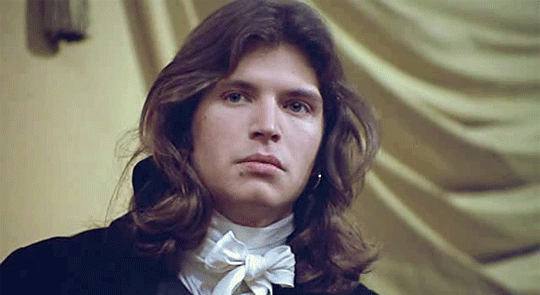
As promised, here is an analysis of Saint-Just’s first scene from La Révolution française (1989). You can watch the scene (with English subtitles) here. It sadly misses the dramatic entrance part, but everything else is there. SPOILER: This analysis will not, in fact, cover everything wrong because there’s so much trash you can’t adequately address it in only 1000 words.
In the scene, we see a young man with that hair rushing down the steps of the Convention (in what will be his signature dramatic! style). He pushes people way without even looking at them. There is someone at the rostrum, and many people wait to address the Convention. Saint-Just doesn’t give a fuck. “I demand to speak.” Some deputies murmur a weak protest, but they are shit out of luck because it’s time to introduce a new character, and we need to know what a jerk he is. So of course he’s granted the word.
At first, nobody pays attention, but “just like you, I would die for this Republic”, seems to work. He delivers the speech (which contains maybe two lines from the actual one), and by the end, Marat claps, the Convention claps, Danton and Girondins are suspicious; Robespierre is in love. Camille, oh Camille, does he know he’s just been replaced? Saint-Just pouts slightly (my interpretation) but doesn’t show much emotion. Next scene: Louis receives news that he’s being put on trial. Good job, new boy.
As first scenes go, this is a good introduction to Saint-Just as depicted in the film. But it’s also very wrong for SJ as a historical personality (what we know of him). Which sucks, because it’s not like it’s impossible to make an unsympathetic yet historically accurate SJ, if one wants to go that route. See, Saint-Just in La Révolution française is a prop; he’s not a character with his own complexities, goals or motivations. He is just there to be pretty and evil, and to take Robespierre away from Camille.
So, why is this introduction wrong?
Let us remember that this was Saint-Just’s very first speech at the Convention. He got elected days after his 25th birthday; he was the youngest out there. Also, even with Robespierre’s support (that some claim he already enjoyed), he was an unknown; a peasant provincial from Picardie barely out of his adolescence. He wanted to prove himself and demonstrate that he was a worthy representative. Being rude and pushing people away is not really a good way to achieve that.
Here’s the thing about Saint-Just: despite all stereotypes of the contrary, he respected authority. However, he only respected authority that he felt deserved to be respected. In 1792, “monarchy” was not it. But National Convention? Revolutionary government? Of course he respected it. He fought so much to get there, and he respected the place he was given.
Throwing his weight around, pushing people away, demanding to speak when someone else is at the rostrum, disobeying order... It was really not Saint-Just. He hated commotion and fights that happened so often at the Jacobin club. Even on 9 Thermidor, when Tallien interrupted him and shit hit the fan, he continued to attempt to deliver the speech. They pushed him, and he kept trying to speak, without, I don’t know, punching someone in the face (La Révolution française Saint-Just totally would, which is, admittedly, one of the many, many many reasons why it sucks that they shortened and condensed Thermidor).
The film uses “blame Saint-Just for Robespierre’s turn to darkness” approach. SJ is there to encourage Robespierre into cruelty and cold violence, and, if Robespierre starts to doubt even for a moment, to reassure him that yes, this is how things should be done, you are right Max, let’s kill them all, but particularly Camille; I can’t stand that guy for having you first ridiculing my poetry (wait... SJ’s poetry wasn’t in the film. Why does he hate Camille, again?) Who knows. The only explanation the film provides is that Camille is Good and Saint-Just is Evil, so of course he’d want to get rid of him.
Now, let us see about the speech itself.
The Speech
The speech Saint-Just delivers in the film contains maybe a few lines from the actual speech (notably: “this man should reign, or die”). I don’t have a problem with them not replicating the speech word for word because it followed on what other deputies talked about (which we didn’t hear)*, and because nobody has time for Antoine’s ramblings about antiquity. (And it would take around 10 minutes to act, which would probably provide us with more glorious shots of Robespierre falling in love being impressed, but it would take too much of the running time. I get that.)
So, in theory, I am fine with shortening the speech and paraphrasing, as long as the meaning and content is there. Which... it did on a surface level while also missing the point substantially.
*Not showing SJ addressing what others said before him was understandable (condensing runtime), but it’s another thing that made it seem like he didn’t listen nor paid attention what others were doing. Also, it’s a missed opportunity to characterize him as a jerk full of himself, since his real speech basically opened with: “all that the previous guy said is bullshit, and here’s why”.
Speech in the film: I would die for the Republic and I would fight the enemies of the Republic. We all know the name of the enemy, and I, like none here, am ready to fight against this enemy. Louis is a symbol of traitors among us. We should not hesitate; the king is an usurper.
In short, speech in the film is, kind of, less about Louis and more about what SJ will be important later: his own sense of revolutionary righteousness and for weeding out “traitors” from the Convention.
Another issue with the speech is that it wasn’t just about the speech - it was part of Saint-Just’s introductory scene, so we had to learn about his character through the speech. In the film, SJ is rude, cruel and cares only about... well, we are not sure, because there are no motivations whatsoever, but he is there to push Max when something bad needs to be done. I feel that his rudeness during the introductory scene and the way the speech was delivered fulfil this purpose nicely. However, I am not sure that we actually understand what Saint-Just’s speech was about, except vague “we must kill the king” vibe.
The Aftermath
The scene following Saint-Just’s speech is that of Louis, a doting father, reading a book to his son. Men come and rudely tell him to send the child away. He is to be put on trial. The implication? Saint-Just’s speech won the crowd over and they decided to kill Louis, or at least put him on trial.
In reality, while Saint-Just’s speech was highly noticed (his real-life dramatic entrance into Convention), the deputies did NOT listen to him. The whole point of the speech was that Louis should not be put on trial - trials are for the citizens, which he is not. Louis’ crime is not treason - the monarchy is a crime in itself. Saint-Just argued against the trial. Yes, his speech was highly influential but presenting it in this way puts way too much weight on this newcomer’s words and implies he was the key factor behind the trial.
Other Observations
- There is a long debate among historians whether Robespierre was present for Saint-Just’s first speech on 13 November 1792. (I think the conclusion is “probably not”.) But I don’t mind this change, if nothing else, for those glorious shots of Robespierre’s heart eyes and Camille’s “wtf did this guy come from and why is Max looking at him like that?”
- Marat. It is true that he generally praised Saint-Just as an orator, but he disagreed with this speech (Marat was for trial).
- The reason why this post is dedicated to SJ’s first scene is because I was asked/challenged to write about it. It doesn’t mean that his other scenes were any better (I’d say they were worse). In fact, the entire SJ’s character was a Thermidorized mess.
- That being said, I don’t hate this SJ. I cannot; LRF was my introduction to the whole Frev thing and will always have a special place. Christopher Thompson was ok, particularly in some aspects of SJ. However, the whole thing was a mess and it should be criticized.
- Hair. I promised to dedicate one full paragraph to SJ’s hair, but I... can’t. I simply cannot. I am sorry. I tried, but the words failed me.
- This was more fun that it should have been and there are so many things I didn’t get to say (the entire performance and what this scene means for SJ as a character in the film, a more detailed analysis of the speech and comparison with the real one, etc.) But it did show that I can still vomit write 1000+ words about anything that I have any interest in, which is... good to know, I guess? (Let’s just say that I won’t be winning any SJ contest prizes for laconicism).
183 notes
·
View notes